|
restoring our biblical and constitutional foundations
|
| welcome |
February 2011 Blog Archives
Monday, February 28
4:58 PM Odds and ends...
-
Andy Bowden discusses Myths about Prayer.
-
Becky Lynn on Storms and Sovereignty.
-
My wife has granted me permission to cook supper this evening. The menu? Creamed tuna over rice, with a side of whole kernel corn. Simple but tasty.
4:52 PM Quote of the day (Arthur Sido):
It always bothers me and should always cause you to pay close attention when someone airily claims that a whole chapter of Scripture supports the point they are making without attempting to engage in the text at all and you should especially be on guard when they make statements with enormous implications to your very salvation based on these sweeping generalities.
2:10 PM Two must-read posts by two of my favorite bloggers:
1) Henry Neufeld talks about degrees and credibility in an essay called Real Credentials.
2) Thomas Hugdins reflects on the use of honorific titles in a post called Title or No Title: Matthew 23.
The common factor in these essays? God is not impressed with all of the manmade worldly boxes we place ourselves in. His kingdom is flat. As I said to someone in Winston-Salem on Saturday, If Jesus is not ashamed to call us "brothers and sisters," what's our problem? (Read Heb. 2:11!)
1:57 PM Jesus, as we saw in Mark 4, often taught in parables, and these parables (metaphors) often involved agricultural imagery. The message is clear whether or not you are a farmer or gardener. But my how the parables come to life if you know something about laboring with your own hands in the soil! Our work outdoors today involved pruning our fruit trees. Most were healthy.
But this one was dead, and so I dug it up and removed it.
John 15:5-6 came to mind:
I am the vine. You are the branches. Those who live in me while I live in them will produce a lot of fruit. But you can’t produce anything without me. Whoever doesn’t live in me is thrown away like a branch and dries up. Branches like this are gathered, thrown into a fire, and burned.
The work we did today was a mirror to me: it showed me clearly that I must bear fruit for Christ, that I must respond to the Savior and the seed He is sowing in my life. What fruit I produce in my life depends entirely on that.
1:33 PM Getting involved in the lives of people can be messy. There will be difficulties. You may be unfairly attacked. You may be misunderstood. As I sit at my computer, wondering what to do, my mind keeps going back to Phil. 4:6: "Never worry about anything. But in every situation let God know what you need in prayers and requests while giving thanks."
It's inevitable: If we're going to be serious about relationships, we've got to commit them to prayer. Pray daily. Pray as we work. Pray as we walk. Pray at our desks and in our yards. Pray fervently. Pray expectantly. Pray for wisdom. Pray for courage. Pray for the Spirit to reveal His power. And pray with gratitude. Thank God ahead of time for how He will work in the relationship.
This is a hard lesson for me to learn. Yet one cannot fail to notice the priority of those early Christians in Acts in this whole matter of prayer. Their leaders devoted themselves to prayer (Acts 6:4). The people remained steadfast in prayer (Acts 2:42). On the whole, they were very prayerful Christians. And me? On the whole, I am often prayerless. Perhaps that's why I'm ineffective so often in terms of relationships.
8:52 AM Here's a photo from last Saturday's ladies' luncheon at Bradford Hall. All three of these friends fellowship at Ca-Vel Baptist Church in Roxboro, NC, and are some of our most faithful Ethiopia prayer partners. I am reminded of Phil. 4:3: "These ladies have worked hard with us to spread the Good News." What an honor to know them!
By the way, I think Becky's hair is growing back beautifully, don't you?
8:46 AM One of my esteemed and beloved pastors, Jason Evans, has been offered, and has accepted, a 6-month sabbatical in order to work on his doctoral dissertation at Southeastern. I fully supported this decision by our congregation. No, I do not agree with those who say that a formal biblical education is required to be a pastor. I do not look to a degree. Neither do I look for brilliance. The Scriptures are clear on this matter. A pastor must be didaktikon (1 Tim. 3:2). This adjective can be translated "able to teach" or "teachable." But the dichotomy is a false one. If a pastor is to be able to teach, he must also be able to learn. And if he is to teach, and teach well, he needs to have the resources to do so. He must be able to examine the Scriptures to discern the mind of God on matters pertaining to life and godliness. He must learn to be a thinker. There is great value in earning a Ph.D., but the value is not in the degree per se but in the opportunity it affords to be stretched intellectually. A pastor who is himself an eager learner demonstrates to the church the importance of sound doctrine. My own doctorate changed my life. It laid a foundation of study habits that have remained with me to this day. It equipped me with tools I needed to study the Word of God. It gave me a love of learning. The earliest Christians took teaching seriously. Why should that not be the case at Bethel Hill also?
Below: Jason, the Paint King. Here he is painting the walls of our health center in Galana, Burji, Ethiopia. Jason has now made four trips to Ethiopia and is contemplating a fifth one this November to serve the church in Burji. Jason's example of humble service in the name of Jesus has left a deep impression on me.
8:22 AM Yet another "Student I Supervise":
James M. Cockman, II.
B.A. (Chapel Hill); M.Div. (Charlotte); Ph.D. candidate (Wake Forest).
Biography:
I began my undergraduate preparations at Furman University in South Carolina and then attended the University of Texas at Austin. I acquired a B.A. at the University of North Carolina (1995) in Greek, with a minor in Religious Studies (Hebrew). I then did postgraduate work at Southern Evangelical Seminary (M.Div., 1998). Currently I am a Ph.D. candidate at Southeastern Baptist Theological Seminary in Wake Forest, NC under the mentorship of Dr. David A. Black.
Dissertation title:
THE THINKING OF FAITH: A BIBLICAL - THEOLOGICAL EXAMINATION OF THE RELATION BETWEEN POST- CONVERSION CHRISTIAN FAITH AND COGNITION, WITH SPECIAL EMPHASIS ON PLANT- DENDRITIC METAPHOR
Research Interests:
CHRISTIAN COGITATION & FAITH
FAITH STRUCTURE & MECHANISM
8:16 AM Glad to see that the Liddell-Scott-Jones Greek lexicon is now online.
8:06 AM Tomorrow, in our Greek exegesis class, we will be in Mark chapter 6. As I read that chapter this morning I jotted down these notes:
1) As Jesus is rejected in His hometown of Nazareth (6:1-5), he says to the people: "A prophet is respected everywhere except in his own hometown and by his relatives and family." How true that is! Yet I can think of a few exceptions. My friend Kevin Brown (who has a wonderful blog) pastors the very same church he grew up in. Yes, that is unusual. But not impossible! Kevin reminds me that New Testament elders most certainly were all "home grown." How I wish we could train young Christian pastors in their local church settings rather than in institutions far from their homes. Perhaps many more of them would be able to stay and serve in their home churches if we did.
2) Notice that Jesus sent out the twelve in pairs (6:7-13). I am a firm believer in team ministry. In northern Ethiopia, Becky and I have supported 3 teams of evangelists who went out 2 by 2. One of these teams, as they approach their village, was confronted by the local witchdoctor, who called out a swarm of bees to attack them. One of the evangelists responded, "In the name of Jesus, stop!" Immediately the bees stopped dead in their tracks. Meanwhile, the villagers were watching this power encounter. Our passage tells us that Jesus "gave them authority over the evil spirits" (verse 7). A couple of years ago Becky and I were privileged to attend the newly formed church in that town. And guess who was present that day in their midst? The witchdoctor, who had been gloriously converted!
3) The pericope about John the Baptist's death (6:14-29) contains a major textual variant in verse 20. Most of our English Bibles read something like this: "Herod was afraid of John because he knew that John was a good and holy man. And so he kept him safe. Herod liked to listen to him, even though he became greatly disturbed when he heard him." Some Greek texts, however, read: "Herod liked to listen to him, and every time he heard him he did many of the things John told him to do." I have defended, in print, the latter reading; I think it makes a huge difference how we understand the passage. If you are interested, I would be happy to send you a .pdf copy of my New Testament Studies essay defending the reading epoiei.
4) In the passage dealing with the feeding of the five thousand men (6:30-44), it is interesting that Mark notes various details that are unrecorded elsewhere: the people sit down on the "green grass," and Jesus arranges them "in rows, in groups of a hundred and groups of fifty." My wife will love that: Jesus was organized! These little tidbits speak to us of the eyewitness nature of Mark's account, which (as I have argued in Why Four Gospels?) is nothing less than Peter's own vivid account of the life of Christ.
Incidentally, it is not at all surprising that Jesus taught the multitudes without segregating the children. He did not say to Peter and John, "You take the kids to Children's Church while I teach the adults." In Ethiopia, especially in the rural areas, this is still practiced, much to the benefit, I think, of the entire congregation.
5) Finally, the story of Jesus walking on water in the midst of a giant storm on Lake Galilee (6:45-52) reminds me of the time Becky and I were staying in a youth hostel near Capernaum. Suddenly a great storm descended upon the lake from the Horns of Hattim, and we ended up body surfing the Sea of Galilee. An unforgettable experience to be sure -- and reminder of just how suddenly and unexpectedly one can encounter a storm on that body of water!
7:15 AM Recently I received an email from a married couple that contained this question about giving/tithing:
We tithe at our church well over 10%. But lately we are not pleased with the way the money is being used. We don't believe in lavish wasteful spending. So Dave tell us what you believe the scriptures say about how we can give His money? We want it to be pleasing to our Lord.
This morning I sent them this response:
Good morning ________________,
This morning I read 2 Corinthians 8-9 again. I can think of no better advice than to ask you to read those two wonderful chapters. You will see there that Paul lays down no rules for Christian giving. We are to give as we see a need, and give generously. No fixed percentage is given in these chapters, nor for that matter anywhere else in the New Testament. And notice: the giving went to meet authentic needs, not to pay lavish salaries or to pay off mortgages.
I include here a link to an essay written by two of my friends and colleagues. It is about tithing, and I think it will help you.
http://biblicalfoundations.org/pdf/pdfarticles/bbrtithing2.pdf
But, as I said earlier, the Holy Scriptures are sufficient for us to know the mind of God on this matter.
Cordially yours in the Lamb,
Dave
Sunday, February 27
6:32 PM Yesterday we spoke at length about Phil. 2:3-4 and the need to put other people before ourselves and to look out for the interests of our brothers and sisters in Christ and not just our own. If you would like to see a good example of this truth being "fleshed out," read Why We Are Now the Summit Church Denver. And congratulations to Bryan and his Denver team for following the downward path of Jesus.
P.S. As a Greek teacher, I liked the name "Soma Church." Other Greek-based names are not as acceptable to me, however. On Capitol Boulevard in Raleigh I often pass a church sign that reads "Agape Church" and have to wonder what these people do that leaves everyone's mouth agape.
6:24 PM This email came from a former student:
... a few nights ago we spent the evening reminiscing over all the Dave Black quips we could remember from class. It was almost a game seeing how many we could recall, and after doing so decided to put together a "highlight mix" of all your memorable quotes. We felt like it summed up your influence on us over the last 3 years quite well! Give it a listen if you'd like.
I did. Should I post it here?
6:14 PM Speaking of Greek, my beginning Greek students are translating complete sentences from the Greek New Testament in preparation for our reading of 1 John this semester. I told them that their greatest challenge will be to translate what is there in the text, not what they are already familiar with from their English translations. This is harder than it sounds!
6:10 PM Calling all my Latin students! Read The Ten Basic Rules for Reading Latin (.pdf). Applies to reading Greek too.
6:02 PM There's a new review of the book Ultimate Allegiance here. Allan Bevere and I have the honor of being co-editors of the series in which this volume is found.

Saturday, February 26
3:48 PM Yet another "Student I Supervise":
Tim Decker.
Education:
- B.A. in Biblical Studies, Piedmont Baptist College, Winston-Salem, NC, 2006
- M.A. in Biblical Studies, Piedmont Baptist Graduate School, Winston-Salem, NC, 2007
- Postgraduate studies, Piedmont Baptist Graduate School, Winston-Salem, NC
I am a Th.M. student at Southeastern Baptist Theological Seminary studying the New Testament under Dr. Black. The research for my thesis will focus on the form and structure of Ephesians 1:3-14. I have a passion for both researched exegesis and relevant exposition. I was the first pastor of New Hope Baptist Church in Beaufort, NC, and now I serve as an associate pastor and music leader at Cornerstone Gospel Baptist Church in Bogue, NC.
Research Interests:
- Greek grammar & syntax
- Rhetorical/literary analysis
- NT Textual Criticism
- Pauline Studies
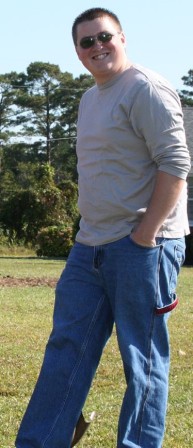
3:35 PM Here's a huge shout out to Al Gilbert and the great staff at Calvary Baptist Church for hosting me today in Winston Salem. For 3 hours we discussed the theme of Philippians: unity in the cause of the Gospel. The letter reminds us that God is calling each and every Christian to learn the secret of bond slave service to the world -- not just in up front roles but especially through humble behind-the-scenes service. I was delighted to meet several former students as well as several prospective ones who are praying about studying Greek with my grammar and DVDs. I sensed in the audience a warm response to the Scripture's call to live a life of radical Christian servanthood. Worldly Christians simply cannot understand this. It seems crazy to them to risk one's life for the sake of the Good News. And it is crazy! The fact is, we must accept such crazy, scandalous love as a normal part of serving the Lord Jesus.
Again, many thanks to all who turned out for the teaching and especially to Zach who manned the book table and Matt who forward the slides for me. You guys are great examples to the rest of us of what humbly serving others in Jesus' name looks like.
5:10 AM "The Spirit has brought you into fellowship with one another." That's one way of translating Phil. 2:1. (It's all a matter of context.) I like that rendering. The willingness to partner with other churches in other countries is a God thing. It is a miracle. It can only be produced by the Spirit. Today in Philippians we will be looking at the qualities of character that the Philippians were expected to display. One of these is a "fellowship" or "partnership" that nurtures and grows the Body of Christ worldwide. It is this sort of practical caring that is one of the greatest attractions to the Gospel, is it not? Suffice it to say that Becky and I view the church in Ethiopia as our own. The Body of Christ transcends race, nationality, education, color. Is it any wonder that we should be advocates of the church there? Or that we should seek to do all in our power to aid and assist it? Did not Paul command us to "share what we have with God's people who are in need" (Rom. 12:11)? This is the quality of "fellowship" that the Lord Jesus expects from us. It is when we love one another that we touch and challenge people deeply.
I hate to be repetitive, but I do want to call your attention again to the urgent opportunity we have to show our solidarity with the brethren in Alaba, Ethiopia. If we really want to reach out with the Gospel, we must attend to life at the periphery and not just at the center. If not Ethiopia, I beg you: get involved somewhere!
Friday, February 25
6:48 PM Brian Fulthorp pens yet another powerful essay. This one is about 2 Corinthians 5:7 and how the Lord is fleshing out this verse in his life. And I agree: living by sight can be just too hard!
6:42 PM Yes, Andrew, it is true: Scholarship is very hard work. Have you considered an avocation? Even if it's something as mundane as light weightlifting or walking around the block? I have found manual labor to be very good for my scholarship. Remember: Jesus said, "My yoke is easy; My burden is light." When we are truly co-yoked with Christ, then our labors for Him should be a joy and delight, because they are actually being borne by Him!
6:31 PM Are you up for two more?
1) Alexander Ellis Stewart: B.A. in Pastoral Ministries (Columbia International University), M.Div. (Columbia Biblical Seminary).
I am a Ph.D. student studying Biblical Theology under Dr. Black at Southeastern Baptist Theological Seminary. My dissertation is entitled “Soteriology as Motivation in the Apocalypse of John.” I have recently published articles in BBR (“Cosmology, Eschatology, and Soteriology in Hebrews: A Synthetic Analysis”), and TynBul (“James, Soteriology, and Synergism”), and currently serve as a youth pastor at Carey Baptist Church in Henderson, NC.
Research Interests: Rhetorical Analysis, Apocalyptic Literature, Eschatology, Soteriology, and the General Epistles.
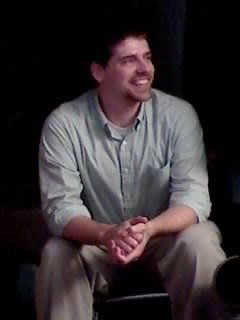
2) Mr Michael Rudolph.
Education:
-
BS, majoring in Chemistry, from Bradley University, Peoria, IL
-
MDiv from Grace Theological Seminary, Winona Lake, IN
-
ThM from Southeastern Baptist Theological Seminary
Biography:
I am a PhD student at Southeastern Baptist Theological Seminary (Wake Forest, NC), studying under Dr. David Alan Black. In my previous studies, I completed a research project (ThM thesis) entitled, “One Church Standing Firm: Finding the Theme and Setting of Paul’s Letter to the Ephesians Utilizing the Methodology of Discourse Analysis.” Currently, I am beginning work on my PhD dissertation focusing upon the use of gar as an intersentential conjunction in the Pauline corpus with the purpose of better understanding both its significance and structural implications. I hope to use insights from lexicography, semantics, pragmatics, and corpus linguistics in my research. Before pursuing my PhD, I was a business owner, active in church leadership, and served as the administrator of a Christian school (K-6th grade). Currently, I am active teaching in my local church where my wife is the choir director.
Research Interests:
-
Linguistics
-
Pauline Epistles
6:15 PM This will be a busy weekend. Right now I'm getting ready for my trip to Winston Salem tomorrow morning. I have the delightful privilege of talking about the book of Philippians for 3 hours. I hope I will have time to show some pix of my mission trips to Asia and the Middle East as well. Tomorrow Becky is hosting a luncheon for some of her lady friends who have partnered with us in prayer. Tomorrow night we have dinner guests. Then on Sunday afternoon B and I will be doing visitation and calling on Bethel Hillians to pray with them and hug on. With the warmer weather I am anxious to get Becky's garden beds ready for her to plant. For the front yard she bought these today:
The backyard raised beds will require roto-tilling, however, before they are ready for anything. I got a start on that project today:
As you can see, life goes on, almost as if Becky had never had cancer. These are eventful days, and our goal is to maximize them if we possibly can.
3:32 PM URGENT NEED:
Beginning today, and for an entire week, Becky and I would like to highlight for you a need that exists in Zobechame, Alaba, Ethiopia. I am painfully aware that it is impossible to describe here in detail the suffering, challenges, defeats, and victories of the church of the Lord Jesus Christ in Alaba. I would, however, appreciate it if you would take a moment and read Becky's latest essay. It's called Urgent Need for the Lord's Church in Zobechame, Ethiopia. In these pages it is our hope that the reader will learn something of the opportunities that exist in expanding the kingdom of God in this far-flung corner of the world. Becky and I are the only white-faced foreigners who work in Alaba. We fervently love the believers there and grieve over the suffering and persecution they experience on a daily basis. Becky's essay is about spiritual reality: about what it means to be the Body of Christ in which the strong help the weak and the burden is shared. Every believer -- and every local church -- in America that is genuinely concerned about the spiritual life of the church in Ethiopia ought to read Becky's essay. You may find, as we have, a new heartbeat that pulses, not for pseudo remedies, but for a return to holy living and single-minded determination to see the church around the world expand, for the glory of God.
I'm warning you: the essay is lengthy. There is no fluff in it. If I have any prayer for the reader of this essay it is that God will use it to help you see the deadly dichotomy that exists between the wealth of the American church and the needs of the church in Ethiopia. To choose deliberately to hoard our prosperity is a sickness. On the other hand, who can tell what the results of our investment might be? May God help us -- especially me! -- to break out of the velvet cage of comfort and convenience and begin living a radical lifestyle of intentional sacrifice in obedience to Christ and His Gospel.
3:12 PM One of the more interesting things I've read recently on the web is the reference to Iran as an Arab nation and its leader as an Arab. Persia, or "Trans-Euphrates" as it's called in Ezra, is Muslim but hardly Arab. Iran is both part of a different ecosystem than the rest of the Middle East as well as a different cultural tradition. Farsi, the national language, is completely unrelated to the Semitic languages (including Hebrew and Arabic) and is, in fact, closely related to Greek, Latin, and our own English. The Persians have a proud and ancient history that is completed unrelated to the Arab world; why should we Americans be so ignorant of it?
10:37 AM And another ...
Michael Stover.Biography:
- The Dating of 1 Clement
- Isaiah
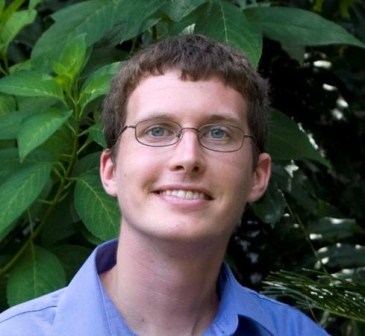
10:23 AM Yet another entry from my "Students I Supervise" file. As you can see, because of the sensitive nature of David's work I have withheld his last name and photo.
David ***, BSME (NC State University), MDiv (Southeastern Baptist Theological Seminary)
Biography:
I am a ThM student researching the Fourth Gospel’s presentation of Jesus as the eschatological prophet like Moses under David Alan Black’s supervision. My previous studies include undergraduate work (BSME, 2000) in Mechanical Engineering from North Carolina State University. In 2003, I completed an MDiv at Southeastern Baptist Theological Seminary in Advanced Biblical Studies.
Since late 2004, my family and I have been living and serving in Southeast Asia among an unreached people group. I am also serving on a SIL affiliate translation team, translating the New Testament into the minority language of the people among whom we work.
Research Interests:
· New Testament Use of the Old Testament
· Greek Aspect Theory
· Discourse Analysis
· Literary Analysis of Biblical texts
Thursday, February 24
8:22 PM While surfing the B-Greek site this evening I ran across a link to Dan Wallace's foreword to Steve Runge's discourse grammar of New Testament Greek. You can imagine my surprise when I saw this statement by Wallace:
What Runge has done is to focus on the exegetical significance of discourse grammar for Neutestamenters.
There is no such word as Neutestamenters in German. In Dan's neologism, the "l" found in the German word has been left out, while an English plural morpheme ("s") has been added. The German word for "New Testament scholar/student" is, of course, Neutestamentler, which is identical in both the singular and plural. I assume that Dan meant to write Neutestamentler ("New Testament scholars/students").

Yes, I know -- this is a "little fox," but it sure does spoil the vine for me (Song of Solomon 2:15), especially in a book that claims to be about linguistic precision.
7:22 PM Received this question in an email today:
I was hoping to get your advice as I am contemplating the opportunity to teach Greek and or Hebrew over the summer at my local church. I have offered a Greek Grammar I class in the past and it was well received: 10 signed up originally. My only concern is that the last time I taught the class only one individual made it to the end. I tutored him alone through Greek II and Exegesis.
I was wondering if there is a better way? ....
One of the possible options I have been kicking around is to request the prospective students to write a check for ~$100 at the beginning of the class. If they make it to the end, I will rip it up, but if they drop out then I would cash it. I know this flies in the face of internal motivation, but it might help the participants to prioritize and to count the cost before taking on the task. It would be my desire that I don't get paid at all for the class...thoughts?
Here's the response I sent him:
When I taught Greek in my local church, I started out with 55 and ended up with 6. I would not charge money but time. I required a "buy in" from my students. Since I was putting in 4 hours a week (pro bono) teaching the class, they needed to put in at least that amount of time in study outside of class each week. If they didn't, they could feel free to stay home. The key question is your motivation. If it is to help people, you will do it as Christ commanded us -- "Freely you have received, freely give." If you view the course more as a "job," then you are right to expect some remuneration.
By the way, one of the 6 students who completed the course (an IT professional) has subsequently helped me considerably with home-based computer issues. He has even come to the house (an hour drive for him) on two occasions to help me. He viewed this as "compensation" of sorts for the hours and hours I invested in his life. It's been great to see how we've helped each other as brothers in Christ.
6:54 PM Care to meet two more of the "Students I Supervise"?
1) John Calvin Morris:
-
BS (Georgia Institute of Technology)
-
MCM (Southwestern Seminary)
-
MDIV (Southwestern Seminary)
Biography:
I am a non-resident PhD student at Southeastern Baptist Theological Seminary, part of an IMB Cohort, Applied Theology in Missiology. Previous studies include undergraduate work at Georgia Institute of Technology (BS 1972), two postgraduate degrees at Southwestern Baptist Theological Seminary (MCM 1974, MDIV 1987), and PhD studies in New Testament also at Southwestern. I am currently serving with the International Mission Board as the Consultant for Theological Education in the Americas as well as adjunct professor of Missiology and New Testament at Seminario Teológico Bautista in Santiago, Chile.
Research Interests:
-
Culture and reproducible hermeneutics.
-
The impact of culture on hermeneutics.
-
The development of a hermeneutical process that is both reproducible (implying the use of culturally appropriate learning preferences) and comprehensive.
-
Contextualized Theological Education: The development of theological training focused on producing leaders that are theologically sound and spiritually dynamic with vision and passion to lead the national churches into full obedience to the Great Commission. Contextualizing theological education involves more than adapting to language, learning preferences, and worldview concerns. It also includes developing national theologians, helping leaders discover and develop Biblical responses to those issues that impact their culture, their churches, and their long-term effectiveness as leaders.
2) Mel Winstead:
I am a PhD student at Southeastern
Baptist Theological Seminary studying
New Testament under David Alan Black (the bodhisattva of NT Greek). I am
currently writing my dissertation titled "The Significance of Verbal
Aspect on the Participles in Hebrews with Special Reference to 6:1–12."
I
previously completed a B.A in Biblical Studies from Piedmont Baptist
College (Winston-Salem, NC), and an M.Div. from Southeastern Baptist
Theological Seminary. Currently, I teach World Religions at South
Piedmont Community College and Old Testament for Fruitland Baptist Bible
Institute in Monroe, NC.
Research Interests:
-
New Testament Greek
-
World Religions
-
Biblical Studies
-
Being a Christ-honoring husband and father
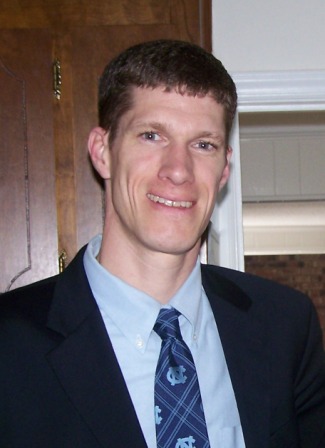
6:33 PM Could you hear it? The famous UNC gong, that is. You get to smack that thing when you've finished your radiation treatments. Here's Becky performing that joyful task at around 4:00 this afternoon.
This has been a long journey. But we did it together, hand in hand, and that made a big difference. For both of us.
Our thanks to our Savior Jesus Christ for carrying us along. We have never doubted your presence and goodness, Lord Jesus. We also want to express our deep appreciation to everyone at UNC radiology who served us so cheerfully and professionally during our Cyber Knife treatments. These included:
-
Nadia and Kevin (our radiology technicians)
-
Crystal (aka "April") and Suzanne (our nurses)
-
Drs. Higgenson and Morris (our radiologists)
-
Jessica (our receptionist)
-
Tanya (our insurance liaison)
We will miss all of you greatly but we certainly do look forward to having you out to the farm soon for a reunion! You are the greatest staff anyone could ever want.
With much love and affection,
Dave and Becky Lynn
9:05 AM Guess what today is? Becky's final treatment for cancer for a very long time! That's right. After months and months of chemotherapy and radiation treatments, B will have her fourth and final Cyber Knife procedure this afternoon. Want to join us in the celebration? Then offer up a huge prayer of thanksgiving to the One who has made it all possible.
Of course, the medical staff at UNC is not to be neglected. As you can see, Becky was baking yesterday, and she will present these poppy seed cakes to the doctors, nurses, and technicians at UNC oncology radiology today.
I predict there will not be one dry eye. It sounds strange to say this, but we will miss seeing these wonderful people. And I know they will miss seeing Becky's smile, sensing her huge heart, and benefiting from her encouragement and counsel.
So today we close the pages of one chapter, only to begin writing another. Where will all of this lead? We won't know for 6 months. But God knows. And that is good enough for us.
8:42 AM Yesterday, this blogger wrote:
Regarding the biblical languages, my Hebrew is currently pathetic and my Greek is not what I'd like it to be (sorry Dr. Black). I'm still working at it, but it is a sort of one step forward, one step back process.
I really appreciate the honesty. How to keep up with one's languages (ancient or modern)? My advice is simple: Read a little bit every day. Or watch a You Tube clip (in German, French, or whatever). Or take a refresher course. (Several of you are using my Greek DVDs for that purpose.) However, you will get nowhere unless you are committed. It's not enough to "confess" one's sins. There must be genuine "repentance."
What a shame it is that so many of us seminary graduates have lost our facility in the biblical languages. Especially when we worked so hard to acquire it.
8:21 AM Kevin Brown provokes thinking in his latest essay called God's Accuracy. A sample:
God’s wisdom is seen in the making of an elephant… The four legs of this great beast all bend forward in the same direction. No other quadruped is so made. God planned that this animal would have a huge body, too large to live on two legs… For this reason He gave it four fulcrum so that it can rise from the ground easily.
The horse rises from the ground on its two front legs first. A cow rises from the ground with its two hind legs first. How wise the Lord is in all His works of creation!
Incidentally, to me this is biblioblogging at its best -- quite unlike the pointless perambulation going on in so many places today.
8:08 AM No more silly, inane, and condescending warning labels at Lifeway bookstores, I see. Even more to the point: Does anybody buy books at bookstores anymore?

7:56 AM I like gut-punching perorations. Over at Jody's Devotionals, Jody Neufeld offers one of the best I've seen in a very long time. Her essay is called Taxes and Gifts.
7:50 AM Yet another poor soul who falls into the category "Students I Supervise":
Thomas W. Hudgins, B.A. (Southeastern College at Wake Forest), M. Div. (Southeastern Baptist Theological Seminary).
Biography: I am an Ed. D student at Southeastern Baptist Theological Seminary pursuing research in the field of education and the New Testament. My previous studies include undergraduate work at Southeastern College at Wake Forest (B.A., 2003) and graduate studies at Southeastern Baptist Theological Seminary (M.Div., 2010), where I completed a research project for Dr. David Alan Black entitled “An Exploration into Discourse Analysis and an Extension of its Method in the Exegesis of John 17.” I am serving as the Director of Seminario Bautista Vida Nueva in San Salvador, El Salvador. Currently, I am co-translating Learn to Read New Testament Greek into Spanish with my wife.
Research Interests:
-
New Testament
-
Jesus & the Old Testament
-
Latin American Theological Education
7:44 AM Undoubtedly you're heard something about the soul-searching that is going in the United Methodist Church. Henry Neufeld has his pulse on the issues and notes that at least one UMC member has come up with a pretty good definition of what it means to be Methodist. Read John Meunier Wants to be a Methodist.
7:22 AM "Students I Supervise":
Paul Aaron Himes: BA and MA in Biblical Studies (Maranatha Baptist Bible College), M.Div. (Calvary Baptist Theological Seminary), Ph.D. in New Testament, dissertation stage (Southeastern Baptist Theological Seminary).
I am a Ph.D. student in New Testament at Southeastern Baptist Theological Seminary. I am currently in the dissertation stage, am privileged to have Dr. David Alan Black as my supervisor, and my dissertation is entitled "A Foreknown Destiny for the Destitute: An Examination of 1 Peter's Concept of Foreknowledge in the Establishment of Social Identity." My research interests include New Testament exegesis (especially the general epistles), biblical theology, NT/Koine Greek, hermeneutics, linguistics, second temple literature, and apologetics (especially in regards to the origin of the universe), with forthcoming articles in BBR (Petrine theology), JETS (1 Corinthians/philosophy), and Science & Christian Belief (cosmology).

Wednesday, February 23
7:12 PM Odds and ends:
-
Talbot School of Theology announces an opening in Christian Education.
-
Matthew Myers asks, To Over or Under-Translate?
-
Andy Bowden has begun a list of German New Testament lecturers. Look for this list to expand considerably in the coming weeks.
-
Ed Stetzer is right: "It is easier to talk about Southern Baptists reaching the lost; it is harder to have the lost in your home," Stetzer said. "You cannot lead what you do not live. None of us can. Live it, and then lead us to live it."
6:51 PM A huge thank you to my colleague Joshua Waggener and his wife Jessica for a wonderful meal in their home last night in Wake Forest. We enjoyed homemade pizza, homemade ice cream, and they sent me home with a loaf of homemade bread. Josh is currently completing his Ph.D. in music theology at the University of Durham in the UK under Bennett Zon. I also enjoyed lecturing in Josh's music history class yesterday on the poetry and hymnody in the Greek New Testament. I love the collegiality here at SEBTS. What a blessing from the Lord.
6:43 PM The following comes from the Louisiana College website under academic position openings.
Christian Studies. Four positions as listed below:
1. Ph.D. preferred but ABD will be considered. Must be doctorally qualified to teach Old Testament, Hebrew, OT exegetical intensives, and surveys of OT and NT. Successful candidate must affirm the Baptist Faith and Message and the Chicago Statement on Biblical Inerrancy.
2. Ph.D. preferred but ABD will be considered. Must be doctorally qualified to teach Philosophy, Christian Worldview, Apologetics, Ethics, and surveys of OT and NT. Successful candidate must affirm the Baptist Faith and Message and the Chicago Statement on Biblical Inerrancy.
3. Ph.D. preferred but ABD will be considered in Systematic Theology and Christian Studies (Includes but is not limited to - Systematic Theology, Christian Worldview, surveys of OT and NT). Poistion may entail opportunities to teach at the graduate level with the opening of the proposed Caskey School of Divinity. Successful candidate must affirm the Baptist Faith and Message and the Chicago Statement on Biblical Inerrancy.
4. Must complete Ph.D. by time of appointment, preferably in Preaching.
Pastoral Ministry. Teaching experience is valued but pastoral expereince is required. Teach variety of courses in the proposed Caskey School of Divinity (Included but limited to - Biblical Exposition, Homiletics, and Pastoral Ministry). Successful candidate must affirm the Baptist Faith and Message and the Chicago Statement on Biblical Inerrancy.
Candidates for must demonstrate a vital Christian faith and integrate the Christian faith with teaching and learning. All positions are tenure-track and begin in August 2011.
6:33 PM I know of nothing that will squelch genuine Christianity like slavish adherence to ecclesiastical tradition. With that in mind, Arthur Sido posts a must-see video series on the Amish here. It's the story of two brothers who were excommunicated from their Lancaster, PA, congregation because they engaged in such devilish practices as reading their Bibles, singing English hymns, and attending Bible study. I watched every episode of this BBC report and found it fascinating.
Here's part one:
6:23 PM The Antioch School of Hawaii has a fabulous website you'll want to look at, especially if you are as eager as I am to see biblical and theological education returned to local churches as much as possible. For their mission and goals, go here. For years I have been training students in the context of the local church. Most recently I taught a course in New Testament Greek at my home church. The experience has been exceedingly rewarding. It has also driven me time and again to reflect on the first principles of church leadership training. Why send young men in Hawaii away to study in a semi-monastic institution on the mainland based on secular models of education when they can be trained for ministry at home? Sheer empiricism teaches us that there is a better way. Let the seminary come alongside the local churches and enable them to teach and prepare their own leaders!
6:15 PM Today I'm starting a new blog series. It's called "Students I Supervise." I've asked my current post-graduate students (there are 12 of them) to email me a brief description of their background and research interests. To start things off, here's:
Alan Knox, BEE (Georgia Institute of Technology), MSEE (Georgia Institute of Technology), MDiv (Southeastern Baptist Theological Seminary)
Biography:
I am a PhD student at Southeastern Baptist Theological Seminary studying Biblical Theology under David Alan Black. I am currently writing my dissertation titled Mutual Edification as the Purpose of the Assembled Church in the New Testament: A Study in Biblical Theology. I previously completed undergraduate and graduate degrees in Electrical Engineering from Georgia Institute of Technology, and an MDiv degree from Southeastern Baptist Theological Seminary in Advanced Biblical Studies. I taught New Testament Greek for three years adjunctively for The College at Southeastern in Wake Forest, NC.
Research Interests:
-
Biblical Theology
-
New Testament Greek
-
Ecclesiology
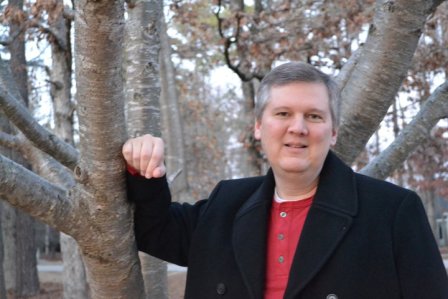
Tuesday, February 22
6:27 AM Andrew Thompson asks What's a fax machine?
6:22 AM Thomas Hudgins (translator par excellence!) reviews Two Views on Women in Ministry. Outstanding job, too.
6:14 AM Tell me it's not so!
6:04 AM What do you remember about the Jesus Movement? Most people over 50 will answer "the long hair and mariachi sandals." In my mind's eye I see a worship service in front of the Hilton Hawaiian Village Hotel sponsored by the Waikiki Beach Chaplaincy (a popular para-church organization at the time). I see myself paddling in from the surf to "attend church" on Sunday morning before paddling right back out again. Don't tell me the Jesus Movement didn't have its advantages!

The downside, of course, was our utter rejection of the institutionalized church, which we all knew was filled with nothing but hypocrites of the worst kind. In short, for all its strengths, for all its proper emphasis on Jesus, the Jesus Movement was eccentric and off-kilter. It wasn't until I was about 16 or 17 that I realized I was just as much a hypocrite as anyone else at First Baptist Church Windward. When I plugged back in, I did much more than was required of me.

Today, my paper perfect church would be an elder-led, age-integrated congregation that met in a rented facility (no mortgage) and paid no salaries. Instead, offerings would go to the needy and missions. 501(c)3? Out. Self-supporting missionaries? In. So, which is it? The traditional church, or the paper perfect church? Frankly, I think the question misses the point. Jesus promised, "I will build my church." Even imperfect churches. Even churches trapped in tradition. (See Rev. 2-3 for examples of churches that were far from perfect and yet were considered, by Jesus, to be true "churches.")
I do have one piece of advice, however. Put the Great Cause first (Matt. 28:19-20). I can't believe it's God's will that most young evangelicals should spend their lives in the pursuit of "doing church right" when God wants to send people where they're needed most.
Monday, February 21
7:56 PM Good evening bloggers and bloggerettes! This is going to be a bit long, so please bear with me. I just put Becky down to bed and prayed with her. Her pain seems to be much better this time around! But tired she is, so Abednego (to bed she goes). I've been in an introspective mood all day. Mind if I share with you some of my thoughts? Actually, what follows was written on my yellow note pad between the hours of 12:30 and 4:30 today while B was in the treatment room.
Ever since Becky and I entered the "front lines" of spiritual warfare and mission work, it seems like we've been faced with storm after storm. Especially in the past two years. No, we don't see demons lurking at every turn. We've always tried to be very cautious about assigning our trials to demonic activity. The truth is, any kind of intensive servant ministry produces normal, natural stress. The challenge comes when the stress is prolonged and excessive -- when it comes "in spades."
Most of the stresses we've experienced are beyond our control. We've had to learn to live with them by (1) accepting them and (2) adapting to them. When I made the decision as a teenager to surf the giant waves on Oahu's North Shore, I chose to expose myself to certain stressors. Any setback -- a setback was usually called a "wipeout" -- provided an extra degree of stress. When you have lost your board, when you are caught in the white water, when wave after wave pummels you -- this kind of stress, and the fear associated with it, is way beyond anything healthy, normal, or creative!

In a recent email to a friend of hers, Becky likened our journey to the "Perfect Storm" that hit the East Coast in 1991. (Maybe you've seen the movie by the same name.) Several different weather systems, each coming from a different direction, collided off the coast of New England to produce a storm of catastrophic proportions. Of course, every storm has its silver lining. What lessons has God been trying to teach me as we've gone through this "Perfect Storm"? They have been many and sundry.
-
Every trial is an opportunity to accept the circumstances God has placed me in -- with a thankful spirit to boot.
-
Every trial is a chance to "think of yourself with sober judgment" (Rom. 12:3) -- that is, to reassess my personal strengths and weaknesses and to anchor my self-worth in God rather than in my circumstances or accomplishments.
-
Each of these trials has forced me to confess my pride to God and pray for the Holy Spirit to transform me from the inside out and from the bottom up. In particular, my emotions, especially my negative emotions, cause me sometimes to feel that God is distant. During these periods of doubt and self-pity, I find it helpful to focus on Scriptural promises, remembering that "God works together for good all things" (Rom. 8:28) -- even my stress.
-
Finally, every trial is an opportunity to learn to pace myself by becoming more pro-active in some areas of life and by slowing down in others. The goal is always a balance between "burnout" and "self-indulgence." I find this balance harder and harder to attain the older I get. The key, of course, is walking in the Spirit -- letting God show me moment by moment and even second by second what is His good, pleasing, and perfect will. It involves paying special attention to chronic fatigue, which is a sure sign of underlying stress. It is a call to exercise common sense by eating properly, getting proper rest and exercise, heeding the advice of friends, becoming aware of mood swings, and releasing past and present emotional hurts to God.
The bottom of the bottom line? Jesus never promised us a life without discouragement. Even grave discouragement. Especially if we're living life "on the edge" for the sake of the Gospel. Mission work has more than its share of obstacles and stresses. So does normal, everyday life. The trials that Becky and I have faced have all been blessings in disguise. Some of them we just "got over," then moved on. Others remain -- defying resolution. Whatever the trial, we're asking the Holy Spirit to help us make wise and balanced decisions. Our greatest desire is to allow God to use the severe pain and hurt we are experiencing to build our character and to make us more serviceable in His kingdom.
8:06 AM Looking forward to a good but busy week:
-
This morning: Meeting with B's Thoracic surgeon.
-
This afternoon: Cyber Knife #3.
-
Wednesday: Meeting with B's rheumatologist.
-
Thursday: Cyber Knife #4.
It's good to know our lives are secure in His hands. May we be a blessing to others wherever we go this week.
Sunday, February 20
8:42 AM Off to The Hill. Bec's staying home (pain). Please let's keep her in our prayers. Despite the pain and extreme discomfort, she's determined to finish her treatments this week. On the way to church I've got to stop by Lowes and exchange/upgrade the battery-operated screw driver I bought the other day. Not enough torque. Yes, that's what I get for "going cheap." I'm learning!
8:33 AM Speaking of Philippians, just a reminder that my seminar on Philippians meets next Saturday in Winston-Salem from 9:00 to noon. Our goal is to recover the outline and theme of the letter through working only in the text of Philippians itself. If you are thinking about teaching through this book I'd love to see you there.

8:22 AM Craig Blomberg reviews Walter Hansen's The Letter to the Philippians in the Pillar Commentary series. It's an excellent review. But this statement caught me off guard:
Finally, it seems a little odd that Hansen cites definitions from BDAG over 200 times and Louw and Nida only once.
I have always felt that L & N is at best a supplement to BDAG. Maybe I'm wrong!
8:12 AM Prayer of the day (Jim Elliott):
Lord, give me firmness without hardness, steadfastness without dogmatism, love without weakness.
7:51 AM If you are not on our private Ethiopia email list and would like to be added, just let me know. We can't publish everything about persecution on our blog for obvious reasons. Receiving our private emails is one way God allows us to share in the fellowship of His sufferings wherever we are. All across North America and the world there are quiet men and women working behind the scenes, living to help support missions. Their names are known only to God but they are promised their reward. God bless all of you for joining us in the difficulties, sorrows, sacrifices, and joys of missionary service.
Saturday, February 19
6:45 PM So here we sit, Becky nursing her sore hips and back, and me nursing my aching muscles and blisters. What a way to grow old together. Tonight we're enjoying watching Wives and Daughters together. If nothing else, the musical score is unforgettable.
1:52 PM Saturday shout out to Thomas and Lesly Hudgins who have been working tirelessly on translating my beginning Greek grammar into Spanish. For the latest update, go here. Gracias, Tomás y Lesly!
1:38 PM John Byron offers a brief eulogy in memory of Anson Rainey, who just passed away. Like John, I first met Anson in Israel when Becky and I were taking courses at Jerusalem University College. Anson led us on a grand tour of Israel (from Dan to Beersheba) and we quickly became friends. Anson would stay in our home in La Mirada when he visited Southern California. He will be missed.
1:22 PM A thousand apologies for not saying this earlier, but thank you for all of your supportive emails and prayers. "Under His wings" is very much how we feel!
Under His wings I am safely abiding, Tho the night deepens and tempests are wild; Still I can trust Him, I know He will keep me, He has redeemed me and I am His child.Chorus: Under His wings, under His wings, Who from His love can sever? Under His wings my soul shall abide, Safely abide forever. Under His wings, what a refuge in sorrow! How the heart yearningly turns to His rest! Often when earth has no balm for my healing, There I find comfort, and there I am blessed. Under His wings, O what precious enjoyment! There will I hide till life's trials are o'er; Sheltered, protected, no evil can harm me, Resting in Jesus, I'm safe evermore.
1:12 PM Another perfect day weather-wise. Just finished the first of two French drains. "Drained" is how I feel. Time for a couple of Ibuprofen and a rest. Then I'll get some writing done while Becky sleeps. She is getting better, however. She asked me to cook Chinese stir fry for supper tonight, and that's always a good sign.
10:46 AM Jason Evans, one of our excellent pastor-teachers at Bethel Hill, is concluding his series on the book of Acts this month. It has been an astonishing look at the early church. (For summaries, go to the BHBC blog.) How can what happened then happen now? This is the question I can't get out of my mind.
So we've studied Acts. What now?
These early Christians were not perfect. But they put first things first. Evangelism was a "first things" category, and every believer sought to bear witness to Christ. "Make disciples of all nations" was more than a platitude. They were in the Good News business, all of them. They evangelized the world, and did so without mission boards or courses in soul winning. There is no hint they viewed ministry -- whether pastoral or missional -- as the task of the ordained clergy alone. Everyone was a minister! Moreover, the spiritual was never separated from the social. Like Jesus, they went everywhere doing good and preaching the Gospel of the kingdom. Why can't we aim for the same balance today? We cannot have presence alone or proclamation alone. Both are needed. The early church was salt in the midst of a crumbling society. People could see in their lives the transforming power of the Gospel. They cared about the hungry and the poor. They realized that preaching without loving practical assistance was mere talk. Ask anyone who comes to our health center in Southern Ethiopia what brought them there and their answer will be the same: the health care! That many of them are, at the same time, brought under the conviction of the Holy Spirit is due to the genuine Christianity of our staff and their zeal to share the love of Jesus with everyone they meet.
The early church had a quality of shared life that must have been remarkable. Theirs was an every-member priesthood. Theirs was a shared leadership. They prayed and fasted. Their meetings were invariably participatory. Let specatorism be left to the pagans in the arena! We each have a gift. We each have a responsibility to take some active initiative for Jesus! They saw static religion and an over-emphasis on buildings as a betrayal of the New Covenant. (See Stephen's speech in Acts 7.)
What more can I say? The guidelines are there, and they demand from us a response. At every stage we are completely dependent upon the Spirit in the work of renewal and restoration. We cannot effect change on our own. We cannot force the issue. And we cannot escape our utter dependence on the work of the Spirit in us (2 Cor. 3:18).
Don't we want that power in our churches today? Or will we be content with the status quo -- churches that are dull, predictable, bourgeois, dominated by clergy -- a shallow and ineffective parody of what the church should be?
9:33 AM Let's pray for our brother Said Musa who faces the death penalty in Afghanistan simply for being a Christian.
9:26 AM The debate about the Granville Sharp construction continues over at Paul Hime's site. Check out his essay: The Granville Sharp rule: A defense of Daniel Wallace in light of Stanley Porter's review.
9:13 AM Becky's pain seems to be under control now, though it's still there. I think we can anticipate a cumulative effect after CK #3 on Monday and CK #4 on Thursday. Right now it's time for grit.
Thus far it's been a productive morning for Dr. Klutz. I fixed 4 gates in our garden. Now they swing open easily. Having the right tools helps.
Friday, February 18
8:18 PM I just put Becky to bed again. I bought her more (and stronger) pain medication this evening. This has been a rough day, for both of us. Before I head off to my safe place, I was hoping to share a few thoughts with you. One thought in particular, actually. The kaleidoscope of my childhood memories growing up in Hawaii includes the image of a public bus going off a cliff on the Pali Highway between Honolulu and Kailua, tumbling down into the valley below. A friend of mine was on that bus. He survived the terrifying journey. Others did not. Have you ever felt like you were careening down a dangerous mountain highway, your breaks gone? I imagine Peter felt that way in John 21. Some of you have heard me teach from this passage. Why do I like it so much? Probably because I can identify with Peter in so many areas of my life. His equilibrium had been thrown off by recent circumstances, including his own denials of the Lord. And now, waiting for Jesus to show up in Galilee (as He had promised), Peter was really in the frustration cycle. I'm going back to fishing, he said, no doubt to relieve the stress. (Have I over-interpreted the present tense infinitive here? I think not. Peter is not going fishing because he's hungry. He's numb with pain and disappointment. He's returning to his fishing business because that's what he's familiar with. It's his security.) Eventually Jesus would restore Peter's passion. But not immediately. For many days Peter lived on the edge of exhaustion -- physically, emotionally, and spiritually. I want to confess to you that I have struggled more these past 20 months than probably at any other time in my life. Life -- or much of it -- has become a weary journey filled with people (but not necessarily relationships) and events (but not necessarily wholesome experiences). Does that make sense? I know the road I'm on is going somewhere. But where? I'm ready to encounter Jesus again, to sit at His feet and enjoy the breakfast He's cooked for me. Mmm, those fish sure smell good. Like many of you, I'm tired of all the gimmicks and easy answers. And I don't feel guilty in the least for feeling this way. Fatigue, exhaustion, weariness, loss of spiritual passion -- I'm a very normal man who knows the feeling of pain and disappointment that comes from unmet needs and broken dreams. More and more, the things that were once at the center of my life have suddenly drifted away, and even those that remain tax my energy, relentlessly, drastically. The tender encounter between Jesus and Peter reminds me that no one lives well who doesn't have a "safe place" to enter in times of terrible weakness of spirit. In that place I can put aside my false sense of confidence and bravado. It is there, in the safe place, that I realize the only answer to my exhausted, passionless life is Jesus. It is there that I check the condition of my inner spirit, rest in my God, and pray for renewal and restoration.
Well, I'll stop prattling for now. I can smell those fish again. It's time for breakfast with Jesus.
4:34 PM Can you believe it? It was a warm 75 degrees today. A good day to work outside. I started digging this French drain today. Tomorrow I've got to finish it and dig another one, plus rotary till Becky's garden beds. I sure was ready for this weather, weren't you?
8:51 AM I'm struck this morning by the motto of Lausanne II: "The whole church taking the whole gospel to the whole world." There is no room for arm-chair Christians. Or for passive missionaries either. We must stop out-sourcing missions to professionals. As a seminary professor I'll take it a step further: If missions is the THE task of the church, why is it just one subject in the seminary curriculum? Missions is the heart of Christian theology. It's what makes the seminary relevant. Every seminary student is a missionary-in-training. Our calling is nothing less.
8:38 AM "What has just happened in Iran?" Thus begins this powerful (and somewhat lengthy) essay called Iran's post-Islamist generation. The writer is Pepe Escobar, author of Globalistan: How the Globalized World Is Dissolving into Liquid War.
8:32 AM Update: B's got lots of pain today. Even with her meds on board. Hopefully the pain will pass quickly. Your prayers are always appreciated.
Thursday, February 17
8:25 PM I like this piece by Jody Neufeld: Valentine's Day -- Not My Holiday. From her woman's perspective, Jody writes:
It not about things. It’s about caring enough to grow a relationship every day. I saw it this year in the woman who was married to a service man who went away to war and came back without his legs. She held his hand to steady him as he walked and looked at him with such love, that I knew that was “steady” more than her hand.
I saw it in the man who cares for his wife who has cancer, loving her more than he did the day he married her.
I saw it in the couple walking down the street holding hands and holding their canes. Loving each other in the last years just as they did in those first weeks, 60+ years ago.
They gave many reasons as to why they love and it had nothing to do with diamonds or chocolate.
That's some awfully good writing, Jody. On a day when I felt that somebody needed to hit me with the stupid stick, I really needed that.
7:55 PM B's treatment went well today. She's tired and sore from lying down so long. I got her home and she went right off to bed. While Becky was having her treatment I went to vacuum out the car at a gas station in Chapel Hill. In the process I accidentally left her old sewing machine on the curb. We had taken it with us to replace a cord. Of course, when I checked up on it the machine had long since disappeared.

Other than that, it was a fine day.
12:20 PM Off to Cyber Knife #2!
8:10 AM The irrepressible Michael Green, who just spoke on campus, once said:
The home is a priceless asset. It is informal and relaxed. It makes participation easy. The teacher is not six feet above contradiction and there is no temptation to put on a performance.
Many will undoubtedly find his words offensive. Six feet above contradiction? Yet isn't that the impression we sometimes give when we stand behind our enormous pulpits? If Jesus could go low (Phil. 2:5-8), why can't we? Paul too is a good example for us. The one who was "less than the least of all Christians" (Eph. 3:8) also saw himself as "the chief of sinners" (1 Tim. 1:15).
I enjoy it when pastors and teachers minister from the floor, on our level. I love it too when they invite participation from others. Last night at Bible study was an excellent example of this. Wise leadership is not afraid to allow "words of encouragement" from the flock. It could be that they have something to teach us! I think the Spirit laughs at our puny attempts to control Him. Do you really believe that He speaks through others? Then why not conclude every meeting with a simple invitation -- the one found in Acts 13:15 -- "Brothers, if you have any words of encouragement for the people, feel free to speak."
7:54 AM I've received several questions in recent days wanting to know how I managed to learn Greek after getting off to such a rocky start (I dropped out of my first Greek class after only 3 weeks). Rather than being intimated by my failures I tried to allow God to use them as a springboard to launch me forward. Irwin Lutzer, of Moody Church in Chicago, has written a book called Failure: The Backdoor to Success. I've never read it, but I agree with the title! If we walk with God, we will have failures. We need to learn how to bounce back when we do. Because of Rom. 8:28, Plan B can be just as good as Plan A. I've had students in my classes who were on Plan C and Plan D. They've never given up! I say, Thank God for a large alphabet. There's no substitute for old-fashioned doggedness sometimes.
If you're struggling with Greek and I can help, let me know.
Wednesday, February 16
9:53 PM I find it impossible not to link to this excellent essay over at Willis Wired. It's called Leaders are Pot-Stirrers. The author, Randy Willis, writes:
Leaders are not called to maintain the status quo or to allow people to remain in their comfort zones. Leaders are not tasked with keeping things running smoothly. Leaders are called to lead people (including themselves) out of their comfort zones. And that requires stirring the pot!
Looks like we can expect a follow-up essay with pot-stirring suggestions. Can't wait.
9:40 PM If you're at all interested in agrarianism, no doubt you've been following the exciting saga of Arthur Sido and his family. They've posted pix of their new livestock in an essay called Down on the farm. Love it!
9:33 PM Just got the program for the upcoming SNTS meeting at Bard College in Annandale-on-Hudson, New York, this August 2-5. Conveners Chris Caragounis and Jim Voeltz have assembled a fine slate of speakers for their seminar, "The Greek of the New Testament":
-
Eberhard Güting: "Observations of the Language of the Res Gestae divi Augusti."
-
Jesús Peláez: "Prepositions and Preverbs in the Greek-Spanish New Testament Dictionary."
-
Jeffrey Kloha: "The Development of the Greek Language and the Manuscripts of Paul's Letters."
I'm told there will be a respondent for each paper. I am really interested in seeing what my friend Jesús Peláez has to say about prepositional prefix morphemes!
9:21 PM Today a student testified to me how helpful he was finding his Greek interlinear. I asked him to email me with more information. Here's what he wrote:
The interlinear I spoke to you about this afternoon is the Zondervan Greek and English Interlinear New Testament (NASB/NIV), edited by William D. Mounce and Robert H. Mounce. I have found it to be an excellent tool to help me reinforce what I am learning in Greek class. I have also been pleasantly surprised at how much of the Greek text I can understand, albeit slowly!
Amen to that. Outside of class, I don't mind my students using all the helps they can get their hands on. In class, we will continue to use only the Greek text.
5:13 PM Odds and ends…
-
Rick Yount recounts the difference between head knowledge and heart knowledge (knowledge and know-how).
-
When words are not enough.
-
Another of my students has taken up the blogging mantle. Check out Alien in this land.
-
Lindsey Wilson College announces an opening in Religion.
5:05 PM Loved this quote from Andrew Rozalowsky:
Studying the language(s) of the Bible helps me know the Bible better. My study of linguistics is not in vain. It is helping me handle the Word of God. It is helping me develop a deeper understanding of how language works and the Bible is a book!
5:03 PM I was very glad to see a post about seminary education by my publisher Henry Neufeld. It's a bit of a harsh comeuppance, but worth a read. One part of Henry's essay I find especially interesting is the following:
My friend asked me which seminary I would recommend a young person go to in preparation for Methodist ministry. My intemperate answer? “I wouldn’t.”
Yet there are things I like about various seminaries. My problem here is that I don’t like the professional education approach to preparation for pastoring. In fact, I don’t like it much for anything at all. I think our educational system is well-designed to prepare people to live in the 19th century. it’s not completely incapable of preparing people for the 20th century, but it’s not fully equipped for that task. Unfortunately, none of us have the option to live in either of those centuries.
On second thought, the educator in me makes me think that Henry may be going too far!
4:55 PM Speaking of foreign languages, here's our President speaking his (and my) native tongue, Pidgin English: (If you tink I making pilikia, you no like fo make huhu wit me, eh brah?)
4:46 PM If you're struggling with your German (like our friend Jason is), here's some advice:
-
Check to see if there a German Meetup group getting together near you. My assistant Andy Bowden, who is feverishly working on his German, will be attending his first Meetup tonight in Raleigh. How can speaking German with ex-pats not help you with the language?
-
You could also do what my colleague Tracy McKenzie and his family are doing. They are meeting weekly with a German-speaking tutor for group instruction in the language. Tracy is about to leave for Zurich to begin work on a second doctorate in Old Testament and raves about his German tutor. (Today I caught Tracy off guard a bit by speaking to him in Swiss German, a language he will pick up easily enough once he relocates to Switzerland.)
The lesson for all of us is this: Given enough time and energy, anyone can learn to speak a modern foreign language with facility. And there is no better way to reinforce the learning process than by meeting with a native speaker on a regular basis. I did this for a year before moving to Europe and it paid handsome dividends!
Tuesday, February 15
5:58 AM If you're going to learn New Testament Greek, be prepared to take some "casualties." The first casualty will be your pride. "How in the world can anybody master such a strange language? Surely not me!" Languages are good bubble busters. Often you'll be unpleasantly surprised at how little language aptitude you really have.
Which leads me to my second casualty: your laziness. You grimly realize you won't succeed without diligence and perseverance. No way.
The third casualty may well be naiveté. You discover just how many blind spots you have. Such a discovery is always unexpected -- and painful.
The final casualty is jealousy. Or at least it needs to be! How do you know if you're jealous? Jealousy always tears other people down. It always leads to backbiting and resentment. If you are a slow language learner you will be jealous of fast learners. If you get only passing grades you will be jealous of the straight A student.
These "casualties" tell us as much about ourselves as they do about the Greek language. Indeed, if we're not careful, learning a foreign language can aggravate our natural inclination toward sin and self-centeredness. More often than not, we blame others for our own weaknesses and failings; we deny any share of responsibility, even if our share is relatively small. (Of course, Greek profs often share the blame to a great degree!) Good students of Greek step up to the plate of responsibility. They do not act out of pride, sloth, naiveté, or jealousy. We need to keep on examining our own motives, but never the motives of others. That's God job. Ours is to give it our very best, "forgetting what lies behind and straining toward what is ahead." If we do our utmost for His highest, in His strength alone, God will reward us.
Below: Teaching Greek at the Evangelical Theological College in Addis Ababa in 2005. The 6-week course produced 40 Greek lovers from many areas of Ethiopia and formed the basis of our Greek DVD series.
5:43 AM Is Iran next?
Monday, February 14
8:50 PM Nice little serendipity: One of our pastors came to UNC prior to Becky's Cyber Knife treatment to pray with us. Thank you, Jason. It was a very loving gesture and greatly appreciated.
All went well today. Here are some details:
-
Becky's tumors received 253 beams of radiation. The physicists were careful to avoid the heart, carina, aorta, and liver.
-
Proton radiation was used for a total of 1200 centigrays (almost equivalent to rads). Rads measure radiation going through water (which is almost like human flesh); centigrays measure radiation going through human flesh.
-
Comparing this radiation treatment to the previous (pelvic and lymph node) radiation of a year ago, when Becky got 35 treatments for a total of 4500 rads, you can see how "potent" this CK treatment is.
-
250 chest X-rays were also shot to check the lineup of the beams with the gold balls (fiducials) implanted a couple weeks ago by the thoracic surgeon.
-
Total time of shooting: 2 hours, 15 minutes.
Bec said I could post this pic.
My thanks to all who, like Jason, were burdened to pray for Becky today. You are very special to us! Our greatest desire is that others would see God's grace and love in and through us at UNC.
Right now B is showering and getting ready for beddy. Yours truly cooked her a supper of creamed tuna over rice with whole kernel corn. (Did I say that right?) Not too bad for the sous-chef, eh? I'm asking the Lord to give her a super good sleep tonight so she'll have plenty of energy for tomorrow.
10:28 AM Off to UNC!
10:22 AM Shoko, a blind young man in Burji, recites Scripture from memory.
His goal is to memorize the entire New Testament. Sure raises the bar for Awana.
9:28 AM Great news! Cyber Knife is starting! We are scheduled to receive four treatments at UNC starting today at 12:30 and continuing on Thursday of this week and Monday and Thursday of next. The doctors will treat only 2 of Becky's tumors to begin with. If it is God's will it will work. They will do CT scans after 3 months and again after 6 months. Then we will know.
Our God is great!
9:24 AM Is God's love a box of chocolates?
8:49 AM Not that it matters, but here is a picture of my dogs I snapped last night while I was snacking on some saltines while reading. As you can see, they are the politest beggars.
They are, however, under strict house arrest in view of their recently-developed propensity to go gallivanting all over the neighborhood. This explains the big chuckle I got when I read Ed Stetzer's post called Dogma Tweets.
Warning: If you are theologically thin-skinned, you might want to forego it.
8:28 AM Much has been happening in Ethiopia. Special thanks to Becky for writing a detailed update. It's called Sabers and Wordaya Village. Be sure to watch the video at the end!
8:12 AM The lesson of Valentine's Day, I suppose, is the need for companionship. This is a very legitimate desire, even for believers. Christian friend, what you do in life, don't do it solo! Do it in companionship with a brother or sister in Christ. And if that brother or sister happens to be your spouse, so much the better.
Becky and I are very imperfect people. (If you haven't realized this yet, cheer up -- you will!) This is why we need each other so much. We complement each other's strengths and weaknesses. The tendency for a husband is for him to come into a marriage relationship willing to help but never to be unmasked, never to seek to be helped by his wife. The best marriages I know are two-way relationships. Each ministers to the other. They not only give advice, they ask for it.
No earthly person knows me like my Valentine does, and still she loves me. That is called grace. It is no exaggeration to say that Becky has been the best thing that has ever happened to me (other than knowing Christ). For 34 years now, in the nitty-gritty give and take of life together, we have learned that we are truly members of one another. We have learned to act out this unity, to visibly and audibly love each other, to break down old habits and barriers of pain, and by the sheer grace of God to fight and claw our way back to each other. Through it all, on bright and cloudy days, she has been my helper par excellence.
And yet she is much more than that!
Like the women in 1 Cor. 11:5, she engages in the ministry of prayer. Like the women of Tit. 2:3-5, her role as a teacher is well known. Like Priscilla (Acts 18:26), she helps others through personal counseling. Like John Mark's mother, she is engaged in the ministry of hospitality. Like Dorcas (Acts 12:12), she even makes clothes to give away to others! Above all, like Euodia and Syntyche (Phil 4:3), she "wrestles with me in the Gospel" -- a reference, no doubt, to strenuous evangelistic endeavor. If you'd prefer to call her, like Phoebe (1 Cor. 16:1), a true "servant" of God (Greek diakonos), you have my permission!
Throughout the years, Becky and I have discovered the blessing of working together as a team -- a "partnership in the Gospel," if you will (Phil. 1:5). What a joy on this Valentine's Day to be reminded that God uses both men and women in ministry with a balance that one sex alone could never hope to embody.
Happy Valentine's Day, then, to my precious wife Becky Lynn.
Ich lieb' Dich sehr!
Sunday, February 13
7:15 PM Now this is a book review!
7:10 PM Read part 2 of Becky's excellent series on depression.
7:07 PM Death.
7:02 PM This morning brother Jason brought a wonderful message from Acts 27. In verse 15, I noticed this interesting expression: "we were carried along by the wind." (The Greek has epherometha. The source verb is phero, meaning "bring, bear, carry.") The writer Luke, in verse 14, tells us that it was not a mere gust of wind. It was a hurricane-force storm called a "Northeaster" (Euraquilo).

Now, what I found particularly interesting is that the very same verb (phero) is found in Heb. 6:1. And yet which translation of the Bible correctly portrays this image of being carried? (But see the ISV.) We are not told to "press on" to maturity. We are, rather, told to be "carried along" (Greek pherometha). The picture is that of a ship raising its sails, as it were, and being carried forward. Do we not need that today? Is there not a grave misunderstanding of God's sanctifying work in us when we think we can attain it on our own? No, if it is to be done, God must do it, in and through us. And when I come to Him and confess my inability, it is His sovereign work to bear me up and carry me along. Yes, we need the power of God's Holy Spirit like we need nothing else in this life.
One more thought. If the apostle Paul was the author of Hebrews (as one or two very obscurantist New Testament scholars believe), then is it not possible to see in the language of Heb. 6:1 an oblique reference to the wind that blew his ship along in Acts 27? I think so. Thus the remedy to our immaturity is not to "press on" in our own strength. It does not lie with us, but with the Spirit of God. He alone gives the power. It is, as Heb. 1:3 reminds us, Christ who "carries" (pheron) all things forward by His powerful Word.
Let us, then, allow ourselves to be carried along to maturity by the Spirit of God. And this we will do, if God permits (Heb. 6:3)!
6:37 PM Recently the devil attacked my church in Bethel Hill, North Carolina. He used an Islamic radical to do so, and the attack was devastating. You did not know there were radical Islamists living in Bethel Hill, NC, did you? Actually, there aren't any -- as far as I know. But when Satan recently attacked one of our Christian brothers in Burji, Ethiopia, it was also an attack on Bethel Hill Baptist Church in the state of North Carolina. How many times do we refer to the persecution taking place "over there"? Yet there is only one Body of Christ. Suddenly I see persecution in a whole new light. When one part of the Body suffers, the entire Body suffers. As never before, we need to be willing to suffer with the persecuted church wherever that persecution might be happening at the moment. It is through co-suffering that we catch a glimpse of the catholicity of the church -- one church throughout the world, in which our own local congregation has the privilege to a be a small part.
"All who want to live godly lives in union with Christ Jesus will suffer persecution," says 2 Tim. 3:12. How dare we think we have a right to be an exception here in North America! It is only because of our faulty ecclesiology that we do not suffer when those in other nations do.
7:59 AM From Australia comes this question:
I read with interest that you had a lot of trouble in learning Greek in your first attempt. What kept you plugging away at it to learn and what did you find helped the most in your eventual learning of it?
This was my reply:
There were two problems here -- me and the institution.
First me. I was born and raised in Hawaii, where the public school was (at least when I attended high school) abominable. Thus when I entered college I had had no foreign language experience whatsoever. Added to this was my natural inclination toward laziness and mañana thinking. (Hey, you'd be lazy too if you grew up on a beach and surfed all the time!) Hence the odds were stacked against me when I enrolled in my first college Greek course.
The institution helped little. My Greek professor's philosophy of teaching went something like this: Weed out all of the slow learners and concentrate on those with an aptitude in foreign languages. Nothing was taught on my level -- that level being rock bottom. Thus after only 3 weeks in the class I dropped out -- and not only I but about half of the class. It was only by God's sovereign grace that I discovered Moody Bible Institute's correspondence course in New Testament Greek, which I was able to ace in just 4 months because it was taught on my level ("Greek for Dummies").
I graduated from Biola in 1975 and a year later was hired to teach Greek there. 34 years later I am still in love with teaching this language. In the interim I have often wondered why it is so many "teachers" have not the foggiest idea of how to teach effectively. Here in the U.S. one must be certified and credentialed before one can teach in our high schools. Not so at the college or university level. A Ph.D. in your field of study is quite sufficient, thank you very much. When I was hired to teach Greek at Biola I also enrolled in two courses that changed my life: College Teaching Procedures, and Tests and Measurements. One thing I learned very quickly was that I could not assume that my students knew anything about language, even their own! Hence my method is to start from scratch, and always go from English into Greek ("This is how it works in English, and this is how it works in Greek"). I will do everything I can not to lose a single student in the course of the semester. If I do, I always consider myself at least a partial failure. Greek is logical, and when it is taught that way even the least capable student among us can learn it -- even a boy from Kailua Beach on Oahu.
7:21 AM What a wonderful thing, this concept of shared leadership. Whether it's the 12 apostles, or the 7 servers in Acts 6, or the 5 prophets and teachers in Antioch, we see that Jesus never entrusted leadership to a single individual. Last week, in our Mark class, I intended to discuss this fact but forgot to. (In Mark 3, Jesus chooses the 12.) But it bears noting. In New Testament terms, pastoral ministry is always a shared ministry. Unity yet complementarity are the twin hallmarks of genuine leadership. The gift of the risen Christ to the church is a partnership of ministry. (Please read Eph. 4:11.) I admit that a pyramid model of leadership is more efficient. But we find nothing of the sort in the pages of our New Testaments. I hope you are part of a church that affirms corporate leadership. It will, I suppose, be a little like the church in Antioch (Acts 13), whose leaders were people of vastly different backgrounds and educational levels. Still, leadership was shared. There was no hierarchy of leadership. I so appreciate the leaders in my own church -- how they work together, how they love and trust each other. What an eloquent testimony to the polychrome nature of the church! Once you have experienced it I dare say you will never go back to a dull, monochrome pattern. Very few Southern Baptist churches where I live take this teaching of Scripture seriously. Leadership is almost always exercised singly. This is both tragic and avoidable. How sad for one man to feel himself capable of leading a congregation! Team leadership is not only healthy for the leaders, it is much more fulfilling for the church. If this sounds extreme to you, perhaps you should reexamine the New Testament teaching on leadership. Shared leadership is the normal pattern. The New Testament everywhere abominates domination by one man. How worthwhile it is when we recognize that all are called to serve and that a number are called to lead!
Saturday, February 12
3:57 PM Looks like Ehrman's at it again, but there's nothing to fear, says James White.
Just be ready to reply, "Ehrman? Why not cite the 150 year old German liberals who came up with this silliness long before he slapped a new coat of paint on it and retired to the Bahamas?"
Touché!
3:42 PM Catching up on noteworthy posts:
-
Interesting statistic: 3,500-4,000 churches close their doors each year.
-
Check your knowledge of French here.
-
Brian LePort reviews The Drama of Ephesians.
-
The difference between monologue and dialogue.
-
They've found Noah's ark!
3:20 PM I see that Arthur Sido agrees with my views on the Lord's Supper. What I enjoyed most about his blog post was his reference to a note in a certain Study Bible. The note, it seems, missed the point completely. It's amazing to me how often we circumvent the clear emphasis of a text because our traditions have blurred our vision. The pettifogging nature of New Testament scholarship is sometimes heartbreaking! I think Jesus must have felt the same way with the enormous layer of rabbinic tradition He encountered, much of it pure legalism. Glancing at Matt. 5:16-48, we see how He rejects this tradition, reaffirms the simple teaching of the Old Testament, and then draws out its implications for daily life. "There is a teaching that says ..., but I say to you...." Jesus hoists the traditionalists on their own petard!
To return to the Lord's Supper. The description in Acts 20:7 applies to our churches. With marvelous succinctness Luke has shown us how the early church met to break bread. Their meal was no doubt anticipating the heavenly banquet, "the marriage supper of the Lamb," as the book of Revelation puts it. The Last Supper had replaced the Passover forever! This is a marvelous description of the early church, and the one thing we take away is their focus on Jesus. Christ was the center of their worship. And it can happen again.
But the final word belongs to Howard Marshall:
The Lord's Supper in the New Testament is a meal. The appropriate setting for the sacrament is a table, and the appropriate posture in our western culture is sitting. To describe the central piece of furniture as an altar is completely unjustified in terms of the New Testament understanding of the meal.
2:54 PM As everyone knows, this week I sent my students home with their first exam over the indicative mood. In giving exams I've found several guidelines to be helpful:
-
Set the bar high. You don't have to settle for sloppy, careless work -- and neither do your students.
-
Don't expect students to necessarily be as concerned as you are with exactness and details. Why should they be? Their goal is not to become Greek teachers (this is a generalization) but to learn how to accurately use Greek in real-world ministry.
-
Demand only attainable standards. The more common error here, as I have said, is to aim too low. We need to stretch our students. But always be reasonable.
-
Be firm but positive. Always commend good work. A simply note that says "Great job!" can go a very long way.
-
See yourself as an enabler. The goal is not the exam. It is training, both by precept and example, to be careful expositors of God's Word.
-
Finally, remember this: To demand excellence of our students is not chauvinistic or a sign of imperialism. We do it to ourselves. We are all accountable, both to God and to each other. The key to a fruitful relationship between student and teacher lies in the concept of shared stewardship. Each of us has a responsibility before God, and we must trust Him for enablement. After all, "without Him we can do nothing!"
I hope my teaching will help my students to be better prepared for the work to which God has called them. I hope above all that it will help them to live out the Good News that so captivated and transformed a band of 120 on the Day of Pentecost so long ago.
11:29 AM Gorgeous sunshiny day. Taking Becky out for a long country drive.
10:41 AM Curious as to what a fulltime missionary looks like? Then read the latest essay on our home page: On Being a Missionary.
10:33 AM Do you need to forgive someone today? Let these words of Michael Green be an encouragement to you (Matthew for Today, p. 176):
Naturally we may find it hard to forgive. Peter did. He wanted to know how few times he could forgive his brother (poor Andrew!). He suggested seven times, and must have felt he was offering the moon: the rabbis reckoned three times was enough! But Jesus' reply will have shattered him. Not seven times but seventy times seven. It means go on and on and on forgiving. Not, of course, 490 times, but constantly. God's pardon is like that. Ours must mirror it if we are in his family....
To say 'I forgive you' is not enough. It needs to be repeated whenever we feel the sense of grievance rising in us afresh.
Friday, February 11
7:58 PM Becky and I just got back from eating at our local Chinese restaurant. Her invitation. Always happy to accommodate!
5:38 PM I'm feeling really proud of myself today. This afternoon I changed the water filter in the downstairs crawlspace, all by myself. All I had to do was buy a special wrench from the plumbing store this morning. Our water once again flows freely. Victory!
But not all the news is good. A month or so ago our hot water had turned warm. So I checked the water heaters and the owner's manuals, but to no avail. I read or saw nothing I could do. So naturally I called a plumber. After two minutes of labor -- and a hefty $90.00 bill -- we had hot water again. How was I to know that all I had to do was remove a cover plate and flip a reset button?

Pray for me. Seriously. I am the world's greatest klutz when it comes to household repairs. But now that Nate has his own family to take care of it's time for the good Greek prof to step up to the plate ... or at least the reset button.
5:05 PM The news of Mubarak's downfall reminds me of Christ's standing orders for His church. We are to be committed, not to maintenance, but to mission. The Great Commission flows from the heart of a God who sees the nations as they truly are. "The people who walked in darkness have seen a great light," said the prophet about Christ's first coming. And who can doubt that the darkness in Egypt is very great?

What will happen with a regime change there? No one knows. But one thing is certain: Periods of change and disequilibrium are always opportunities for the Gospel. Egypt must now be placed at the very top of the church's agenda in the Middle East and North Africa. Not in terms of sending. But in terms of supporting the indigenous churches there. The world's problems will not be solved by politics. Our Lord came that we might have life and have it more abundantly. Of course, as Christians we can easily fall into the political rut, and a rut is only a grave with the ends dug out. Christian bloggers are thrilled that the repressive era of Hosni Mubarak now appears to be at an end. I fully sympathize with that feeling. But the heart of the matter is spiritual liberation, not human freedom. The Gospel always speaks to the fundamental issues of life. In today's world, the hunger for freedom is all-consuming. But no political philosophy can address the deepest issues of life, or engage the root problem, like the living, loving person of Jesus, who broke the shackles of the grave.
I wonder if Egypt's best days are ahead for it. They can be if Egyptian believers go forth in the power of the Holy Spirit and proclaim a message which, if received, leads to true revolution, the forgiveness of sins, and the creation of a new commonwealth whose sovereign is King of kings and Lord of lords. May we here in North America stand with them in prayer.
10:26 AM In case you wanted to see what an internet community looks like....
10:24 AM This may well be the quote of the century:
Learning New Testament Greek is not just a tool for seeing new things in the text, it is a tool for beginning to see why many of the things you have been taught to see might actually be bad interpretations.
10:03 AM Isn't the internet wonderful? I can now write references for my students who are applying to Ph.D. programs and do it all online.
9:57 AM Anybody out there feeling a little beat up today? Thank you, I see that hand. Here's an encouraging word from Charles Spurgeon for us all:
All events are under the control of Providence; consequently all the trials of our outward life are traceable at once to the great First Cause. Out of the golden gate of God's ordinance the armies of trial march forth in array, clad in their iron armour, and armed with weapons of war. All providences are doors to trial. Even our mercies, like roses, have their thorns. Men may be drowned in seas of prosperity as well as in rivers of affliction. Our mountains are not too high, and our valleys are not too low for temptations: trials lurk on all roads. Everywhere, above and beneath, we are beset and surrounded with dangers. Yet no shower falls unpermitted from the threatening cloud; every drop has its order ere it hastens to the earth. The trials which come from God are sent to prove and strengthen our graces, and so at once to illustrate the power of divine grace, to test the genuineness of our virtues, and to add to their energy. Our Lord in his infinite wisdom and superabundant love, sets so high a value upon his people's faith that he will not screen them from those trials by which faith is strengthened. You would never have possessed the precious faith which now supports you if the trial of your faith had not been like unto fire. You are a tree that never would have rooted so well if the wind had not rocked you to and fro, and made you take firm hold upon the precious truths of the covenant grace. Worldly ease is a great foe to faith; it loosens the joints of holy valour, and snaps the sinews of sacred courage. The balloon never rises until the cords are cut; affliction doth this sharp service for believing souls. While the wheat sleeps comfortably in the husk it is useless to man, it must be threshed out of its resting place before its value can be known. Thus it is well that Jehovah trieth the righteous, for it causeth them to grow rich towards God.
9:44 AM Who said it?
The Lord's Table should have been spread at least once a week for the assembly of Christians, and the promises declared in it should feed us spiritually.
9:40 AM Nice essay here from Jody Neufeld: The "Ghost" of my Sin. Jody writes:
The bottom line is: we don’t like to have our own sin pointed out. Oh, we have plenty of ways of avoiding saying that straight out. The other person is overly critical, or controlling, or nagging, or just plain negative. Perhaps they’re proud, arrogant and judgmental. We’ll think or say just about anything to avoid simply admitting that they make us angry because they point out our sin.
9:30 AM Egypt's Christians: Hopeful but nervous.
9:11 AM Another thought on yesterday's post about Francis Schaeffer and the temporary nature of fame. The letter to the Hebrews in the New Testament is formally anonymous. (I say "formally" because the recipients of the letter surely knew who the author was.) Imagine that. Here is one of the most beautifully constructed documents ever written -- a magnificent cathedral of truth, if you will, with beauty, symmetry, artistry, sublimity -- and the author decided to remain anonymous. It's almost as if he wanted to point our attention away from human authorship altogether and toward the letter's divine Author. I submit to you that that took a great deal of humility -- the kind of humility the author of Phil. 2:5-11 so exquisitely describes:
In God's own form
existed he,
And shared with God equality,
Deemed nothing
needed grasping.
Instead, poured out in emptiness,
A servant's form did he possess,
A mortal man
becoming.
In human form he chose to be,
And lived in all humility,
Death on a cross
obeying
Now lifted up by God to heaven,
A name above all others given,
This matchless
name possessing.
And so, when Jesus' name is called,
The knees of everyone will fall,
Where'er they are
residing.
Then every tongue with one accord,
Will say that Jesus Christ is Lord,
While God the
Father praising.
Thursday, February 10
2:55 PM Allan Bevere writes:
For Christians, modern political progressivism is not progress and modern political conservatism is not a guarding of our best traditions. And for Christians to identify themselves by such labels is not only to undermine the politics of God's Kingdom, it is to embrace idolatry. In such a context no wonder doctrine becomes unimportant. When the world of Christendom sets the agenda, doctrine becomes nothing more than matters of personal preference, and morals are founded on the slippery and vacuous rantings of emotivism and not on Scripture informed by our deepest and most profound traditions. And when the connection between doctrine and ethics is lost the church is left with very little in the way of uniqueness with which to commend itself to those outside the walls of its edifices, which stand as crumbling monuments to its embrace of civil religion and a day now long past. And those who insist that doctrine matters are ridiculed as close-minded snobs as if God cares little about his people's search for truth and much about their living a domesticated ethic which amounts to little more than being nice. The mainline Protestant project sows the seeds of its own demise.
This is a profound statement. Politics continues to co-opt the Gospel, and it will do so as long as we remain content with our "crumbling monuments."
Read United Methodists Have No Identity.
2:14 PM Here's a sign of the times. When I mention Francis Schaeffer in my classes, a majority of the younger generation doesn't seem to recognize the name. A generation ago almost everybody knew who he was. I myself had the opportunity to hear him when I lived in Switzerland. (In case you're still wondering why Schaeffer is a significant figure in evangelicalism, go here.)
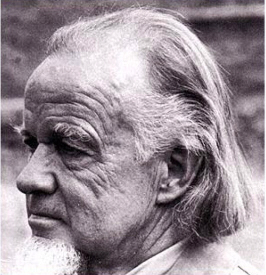
My point is that life is ephemeral. I am currently incarcerated in a particular place in time and space. One day, when I pass off the scene, the memory of anything I've said or done will be forgotten.
What should we do about this?
I suppose a good starting point is to stop being so eager for fame and recognition. Our names are written in His Book, and that's quite enough. Earth's books grow mold (right, Brian?), and signatures fade, but the record of heaven belongs in a different category. We are all great autograph hunters in the here and now, seeking the inscription (even in our Bibles!) of friends and the famous. (I had to smile when I was once asked to sign my autograph in the fly leaf of someone's Bible. I politely refused, adding, "I only sign books I've written.") The only autograph that matters is God's. What a perspective this lends to life. Jesus' true servants care only about faithfulness, not popularity. Their greatest delight is to serve the Lord joyfully, even in complete obscurity if necessary. Francis Schaeffer was one such faithful servant of God. And today he sees his Master's face clearly, no longer as in a glass darkly. I'm sure the good apologist's forgotten status today means nothing to him!
1:15 PM Update: Becky's Cyber Knife has been postponed until next Monday. The doctors wanted more time to fine tune the procedure. Thanks to all who were praying for today's treatment!
8:40 AM Quote of the day (Katy Brown):
Readers really are leaders. Reading stretches the brain like nothing else. A good book is better than any movie. You’ve seen a movie and heard someone say, “The book is better.” Books have a way of pushing us. Kids have lost this in the fast-paced, thrilled culture. I love Facebook, but it can easily eat up hours of time. People don’t know how it feels to have to imagine anything anymore. Sometimes we need to have to be patient for the climax of a book or have to really think about the story line. I love movies and TV shows, but they just don’t require much brain power. Reading does. Lets get back to reading and thinking. It is worth it and is incredibly enjoyable!
Read Readers Are Leaders.
8:28 AM My beginning Greek students were sent home this week with their first exam of the semester. We reviewed the entire indicative mood, and did so by reviewing verb morphology. It can hardly be accidental that language can be studied scientifically. When my book Linguistics for Students of New Testament Greek emerged, in the 1980s, there was very little on the market that spoke enthusiastically about the contribution of linguistics to the study of Koine Greek.
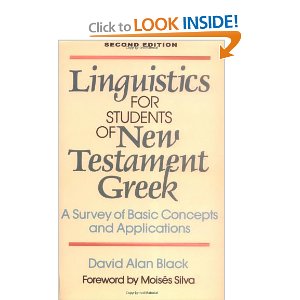
Mercifully, in recent years a paradigm shift has occurred. Books on Greek linguistics are proliferating. That is an encouraging development. But we still have a very long way to go, I feel, before the average beginning student of Greek recognizes the benefits of morphology. I tell my students, most sincerely, that I cannot teach Greek any other way. No aspect of Greek linguistics is too menial or exacting if it can help us to understand the life-giving words of grace we find in Scripture.
8:22 AM Becky has begun a series of essays on the subject of depression. It's over at the Bethel Hill website. For part one of her series, go here. If you've ever struggled with depression (and who hasn't?), you will want to give it a look.
8:08 AM We got a light dusting last night. Simply beauteous.
7:55 AM This week, in our exegesis of Mark class, I'm asking my students to read The Jesus Paradigm. I do so for one simple reason: Jesus is the model for ministry. This fact is all the more relevant in a world (and often a church) that is increasingly uninfluenced by the example and teaching of Jesus. Mark 10:45 reminds us that, like our Master, we exist "not to be served, but to serve." For many years I failed to exhibit the character of a servant. Or if I did exhibit it, I did it poorly. Isn't it astonishing that one can master the biblical languages and yet fail to be devoted to selfless service to others? Hence the need to study the life of Jesus. We meet the same characteristics of service in Paul as we find in Jesus. He too was prepared for costly discipleship -- for suffering and rejection. For Paul, the divine "call to ministry" lay simply in a life of obedience, witness, and perseverance. The whole gamut of ecclesiastical titles ("Reverend," "Doctor") he would have found reprehensible. By word and by deed Paul demonstrated that the supreme glory of the Christian is service to others. If only my students could get a grasp of this! If only they could see that it is by donning the apron of service that true leadership is exercised! I know of no reason why this should not happen. We have the infallible Scriptures as our guide and Jesus as our paradigm. It's unfortunately so revolutionary a concept that it will take time to be assimilated.
In 2 weeks our class will read Scot McKnight's The Jesus Creed: Loving God, Loving Others, a book that superbly shows how true servants of Christ are always to be judged: by their love.
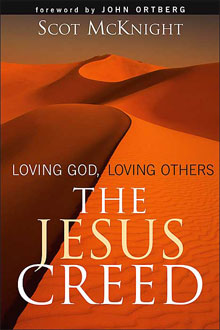
I am not in the least advocating everything my friend Scot stands for. My concerns about the emerging church movement are well known on campus. What I am urging is that my students rediscover the centrality of the love command in the New Testament -- and Scot's book serves this end with single-minded focus. I do not propose to examine the topic of Christian service part from an exegetical study of the text of Mark's Gospel. I simply want to stress the need for both, or rather, to point out that the former is always the consequence of the latter. It is no accident that I picked Mark to exegete this semester. The pattern Jesus set was the pattern of service. He was supremely the servant of God. That was His honor and glory. So it must be with us.
Wednesday, February 9
6:59 PM Great news! Becky's test results are in and all systems are GO for tomorrow's radiation treatment. Things kick off at 12:30. Trusting God for the results.
6:48 PM Superb supper. Becky's meat balls over noodles are awesome.
5:52 PM I suppose there are few aspects of Christianity that demand a more radical reappraisal than the purpose and function of the Lord's Supper. The trouble is twofold: we are enslaved to tradition, and we fail to give Christ the place of preeminence He requires of His church (Col. 1:18). For these reasons I was delighted to receive in the mail yesterday from B & H Academic a book called The Lord's Supper.
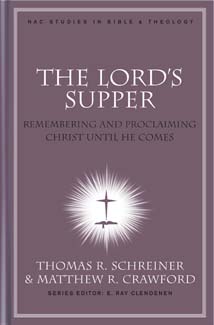
Edited by Tom Schreiner and Matthew Crawford, it is a refreshing call to rethink this vitally important celebration. It's not kosher to say it, but we Southern Baptists have not always been good about questioning our traditions (though perhaps we have done a better job than Eric Carpenter allows). Here, then, is a book that tries to apply scriptural models to the way we "do" the Lord's Supper. More than once I have wished for such a book – and in my excitement I wrote an essay to encourage my readers to delve deeper into the controversy. If you're at all interested in the topic, my essay is called The Lord's Supper, Then and Now.
5:45 PM Odds and ends…
-
Louisiana College announces an opening in Christian Studies.
-
Josh Honeycutt discusses an emotional word. (Mark students, take note!)
-
A Jesus-era house is uncovered in Nazareth.
-
Practice your German by reading this wonderful testimony.
-
In a fascinating article published this week, Justin Raimondo reminds us why we do not need a foreign policy.
-
Paul reminds us of the importance of the Bible in 1 Tim. 4:13: "Devote yourself to the public reading of Scripture." So here are some tips on reading Scripture aloud.
5:33 PM Arthur Sido jumps into the current conversation about expository preaching. Perhaps he overstates his case, but it is certainly true, from where I sit, that many of us pew sitters are still utterly too passive in our attitude toward our responsibility to be involved in mutual edification. We must face the fact that there any many Christians who are content to merely follow the teaching of one man rather than involving themselves in learning (and teaching) biblical truth. It is often here that the influence of multiple teaching elders can be most valuable.
5:24 PM Enjoyed talking with several students today about doing doctoral studies. Not here, but overseas. One student of mine is looking into German universities, another into schools in the UK. One bit of advice if you are in the early stages of researching doctoral programs: Be sure to get to know everything your prospective major professor has written. Then, if at all possible, try to meet him or her personally (to make sure the chemistry is right). It helps if your professor attends the annual SBL meeting in the States. But if necessary you should consider a trip abroad.
Of course, I am not against anybody studying in our own doctoral program here at SEBTS. Quite the contrary! I presently supervise several doctoral students in a wide range of topics, including the book of Revelation, James, and 1 Peter, as well as research into Greek conjunctions and biblical ecclesiology. I am open to supervising doctoral students in any field relating to New Testament and am only an email away. Moreover, the field of New Testament is well represented here at SEBTS, with 7 fulltime members in the department with strong emphases in hermeneutics, discourse analysis, and Johannine studies, to name but three areas. To read more about our program, go here.
Monday, February 7
8:10 PM Supper's ready! We're watching the suspense-thriller Duel along with our meal. Hot date night!!
8:06 PM What I want to be when I grow up: "research professor of theology, ecology, and rural life." Yes, that title actually does exist. I would qualify, don't you think?
7:50 PM I'm getting used to a new slang term being used these days in cyberspace: "peeps." Meaning: "Positive end-expiratory pressure."
You didn't know that, did you?
7:40 PM Just received word of more persecution in Ethiopia. What joy there is in suffering for Jesus! Have you not found it so? Jesus taught us that we should be willing to accept persecution because of righteousness (Matt 5:10). If we identify with Him, we will be persecuted. However, He assures us that those who identify with Him in suffering will receive a great reward in heaven. What a grand blessing.
Still today, Christ invites people to accept persecution for His sake. I thank God for those believers in Ethiopia who are willing to do so, and to do so joyfully!
5:59 PM John Newton once compared spiritual growth to an oak. An oak tree grows very slowly. "Many suns, showers, and frosts pass upon it before it comes to perfection." Even in winter, when the tree seems to be dead, said Newton, "it is gathering strength at the root." I love the simplicity and clarity of that analogy. Spiritual growth is often imperceptible, but every healthy Christian will grow.

So, what is your "growth quotient"? Or better, what is your "serving quotient"? For a mature Christian will always be a serving Christian.
5:46 PM Odds and ends...
-
Becky's test went well. Results forthcoming.
-
Check out By working like this by Alan Knox.
-
The Sidos are adjusting to country living. (Boy does that bring back memories, Arthur!)
-
Looking for some good French resources?
-
Baylor has an opening in Christian Theology/Church History.
-
Tomorrow we'll be in Mark 3 in our exegesis class. I had to smile when I saw a reference in the NET Bible to Mark's "gratuitous redundancy."
-
Looking forward tonight to one of Becky's greatest supper concoctions! (It's a secret.)
7:12 AM Quote of the day (J. Gresham Machen):
The very center and core of the whole Bible is the doctrine of the grace of God—the grace of God which depends not one whit upon anything that is in man, but is absolutely undeserved, resistless and sovereign. The theologians of the Church can be placed in an ascending scale according as they have grasped with less or greater clearness that one great central doctrine, that doctrine that gives consistency to all the rest; and Christian experience also depends for its depth and for its power upon the way in which that blessed.
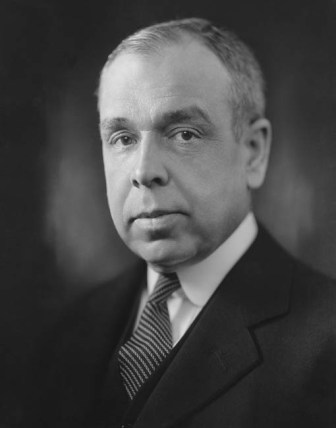
We are all recipients of God's grace. Now we are to become dispensers of it.
7:06 AM Doing missions in your own backyard.
6:55 AM Grateful for this email from Scotland:
Just a quick note to let you know that I've been continually praying for Becky and your family. I'm praying specifically for her healing, but also that God's grace and goodness will be evident to you in the days ahead. I'm so thankful for your willingness to share your personal hardships with others. You and Becky have been a great encouragement to me and have reminded me often that "our comfort is abundant through Christ" (2 Cor 1:5).
Update: We're doing a pulmonary function test this morning at UNC to establish a baseline of Becky's lung function. The first actual radiation treatment is scheduled for Thursday.
Sunday, February 6
8:35 AM As you know, the Cyber Knife procedure is our last option, medically speaking. We also feel that it holds out the greatest potential for success of all the treatments we've tried so far. Yesterday Becky wrote in an email:
We had a really good 4-hour time at UNC Hospital yesterday. The long/short of it is that for the first time since my diagnosis, there seems to be some medical hope. Of course, the doctor can't promise anything....no official studies have been done, but he has had several cases of metastatic cancer (colo-rectal & high-grade uterine) that have responded nicely to this Cyber Knife radiation, with long periods of erasure of the cancer.
For me, the lesson I've had to learn throughout our journey with cancer is to be completely dependent upon God. When hard times come, pray, pray, and keep on praying. The believers in Ethiopia have shown us the way. They have held all-night prayer meetings for "Mama Becky." And they pray on bended knee.
This very Sunday there are literally thousands of our Ethiopian brothers and sisters praying for Becky, in churches large and small. They are a people that understand the power of prayer.
One day some men were touring Spurgeon's famous Metropolitan Tabernacle. Several of them were engineers. The guide asked them, "Would you like to see the power plant?"
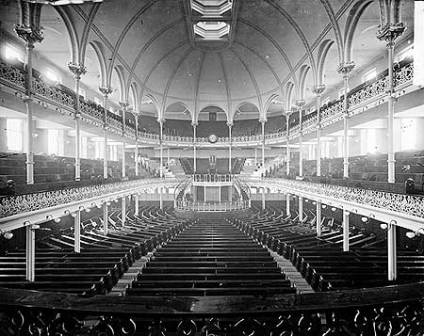
The men were led into a prayer room where 700 people were praying -- and the man who led them was none other than C. H. Spurgeon. He understood prayer. He called prayer "our master weapon."
Do you think this is an area the American church can grow in?
In Luke 18:1-14, Jesus teaches us to pray always and "not to faint" -- that is, become weary. The word "always" does not mean all the time but at all times, whatever the circumstances, however adverse they may seem, and especially when we are in danger of "fainting." God delights in our persistent prayers. "Because this widow keeps bothering me, I will see that she gets justice, so that she'll stop wearing me out with her coming!" (Luke 18:5).
I know you have prayed for Becky Lynn. But today I'm asking you, imploring you even, to persist with me in prayer on her behalf. If I may be so bold as to say it, let's wear God down with our prayers.
"Keep on asking," Jesus said, "and it will be given you."
I am convinced that this procedure has the potential of adding years to Becky's life. Without it, we are probably talking about months.
Thank you so much for joining me at the throne. God's will be done.
7:06 AM Bradford Hall was graced with the presence of Michael and Courtney Sexton last night as we gathered for food and conversation. Michael, an M.Div. student at SEBTS, is currently exploring Ph.D. programs.
At SBL in Atlanta he interviewed with Tom Wright, and since then he's been exploring doctoral programs outside the U.S. So they had lots of questions for Becky and me and, of course, we were happy to share with them what our experiences in Basel were like. Studying overseas can be described in one word:
Awesome!
The reason is you get two educations for the price of one. Not only do you get to work with a professor whom you greatly admire, you learn what it's like to live and work in a vastly different culture from your own. In some cases, you must even master speaking a foreign language -- a great asset for anyone who wants to understand how Bible translation works.
Michael and Courtney, blessings on you as you seek God's will for your lives. He is a Good Shepherd. He won't push, but He'll nudge you enough so that you will have no doubt as to where He wants you to study.
Saturday, February 5
3:30 PM Care to join Becky and me on our walk today?
The brooks were babbling...
The trees were barren...
The leaves formed a blanket for the ground...
The birds had their nests...
The pines awaiting thinning...
What beauty! What a Creator!
1:10 PM Henry Neufeld chimes in on the "interlinear controversy"!
(This is getting to be fun.)
12:55 PM Just parsed the 119 verb forms in Mark 3. Love this language!
12:14 PM This thought just occurred to me:
My favorite bloggers are not bloggers.
That is, my favorite bloggers are not known primarily for their blogging or for their activity in cyberspace. They are not living vicariously, peeking over others' shoulders, bloviating and pontificating about anything and everything, but are teaching classes and publishing books and going places to serve King Jesus. Scot McKnight comes to mind. So does Ben Witherington. For them, blogging complements their ministry but does not define it. They would make good role models for the rest of us, I should think.
As for me, blogging is at best an enjoyable avocation. If it kept me from writing books or going abroad as a missionary, I would cease and desist in a heartbeat.
11:58 AM Two questions for my exegesis of Mark students in preparation for Tuesday's class:
1) Does the compound verb sullupeomai in Mark 3:5 imply something stronger than lupeomai would? The ISV renders the text as "he was deeply hurt because of their hardness of heart." Would "brokenhearted" or "deeply distressed" work better?
2) Does the compound verb diarpazo in 3:27 imply a more intense action than the simplex verb harpazo? Here the ISV has "ransacked."
What do you think?
11:40 AM Astronaut Mark Kelly, husband of Representative Gabrielle Giffords, told an audience that prayers for his wife are working. Praise God! Glad to hear it! All healing comes from Him!
11:20 AM This morning I referred to a past-time we call Civil War reenacting. It's a very realistic hobby. Weapons are accurate reproductions, and the sights and sounds are awesome and loud. But it's still make-believe -- grown men "playing bang-bang."
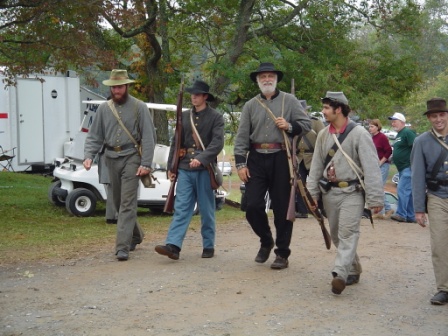
Not so the Christian life. Throughout His ministry Jesus made it very clear that following Him could be dangerous. Discipleship is not a picnic. Jesus calls men and women to tribulation. In 2 Tim. 2:3, Paul reminds us that as believers we are soldiers, and that we are not playing at war. He is saying that by following Jesus you may get hurt and killed. How easy it is to avoid the wider implications of this!
A couple of years ago a young Burji named James served as our translator when Jason Evans and I preached among the warlike Gujis in southern Ethiopia. James knew the risks, and so did we. But still he went. James's martyrdom was a grim reminder to us all that following Jesus can be very dangerous business. Anything can happen.
Friend, the Christian life is not a reenactment. It's the real deal. You had better not follow Jesus if you are afraid of the fight.
11:05 AM If Paul and Silas could sing in jail, we who visit the hospital regularly owe it to everyone to sing our song. It is perhaps the only way most of them will ever hear the Gospel. Every sufferer ought to be a singing sufferer!
10:58 AM In the teaching world we often speak of "outcomes" when we write our syllabi. Here's what I tell my Greek students: "By the end of the course you should be able to read your Greek New Testament with the use of a lexicon." Now, many different roads can lead to this outcome. The most important is probably grammar; then comes vocabulary (which unlocks the door to rapid reading). But should students be discouraged from using other helps in their pursuit of this objective -- interlinears, for example? Looks like one writer thinks so -- that students should "burn their interlinears" (see Mark Stevens' review of Con Campbell's book Keeping Your Greek.)
I respectfully disagree. It is a day of conformity. Individuality is being erased until we all are like eggs in a carton. It is amusing to me to hear people proscribing tools that get students into the text. There is freedom in Christ, and it is unrealistic to think that our graduates will always master the languages to the degree we want them to. I've quoted it before, but the words of an old preacher bear repeating:
Halitosis is better than no breath at all.
Isn't that great?
Oh, if you need an interlinear recommendation, I'd suggest you acquire The Zondervan Greek and English Interlinear New Testament -- which, by the way, is published by the same company that puts out Campbell's Keeping Your Greek (*wink*).
9:21 AM Alvin Reid reports from Kiev that the church in Ukraine faces the same problems we face here at home. He notes,
Thus the gospel must come today to a city like Kiev or a city like Raleigh. We cannot simply speak the gospel to people we hardly know and live insular lives separated from the world for which Christ died. There is a great, missional tide sweeping across the hearts and lives of many who want to see a movement of God, and I pray I will be found riding that wave.
Amen! We cannot live insular lives, friends! This is also the message of Alan Knox in his recent post What surprises me... Thank you, gentlemen, for this reminder.
8:40 AM In commemoration of the 150th anniversary of the Civil War, I thought I'd post my top ten Civil War sites.
10) Bentonville, NC. The Battle of Bentonville was fought March 19-21, 1865. It was the last major battle between Union General W. T. Sherman and Confederate General Joseph Johnston. It was also the first battle in North Carolina that I reenacted when we moved here 13 years ago. The Harper House, which served as a field hospital, still stands.
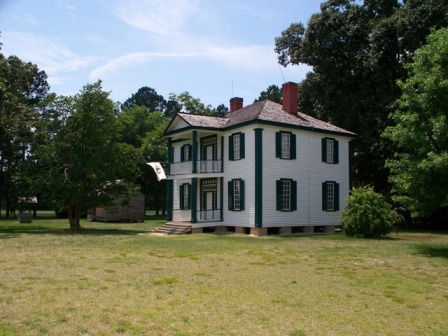
9) Sailor's Creek, VA. On April 6, 1865, one fourth of the retreating Confederate army was cut off by Sheridan's forces near the Lockett Farm southwest of Petersburg. Ten Confederate generals (including Richard S. Ewell) were captured that day. When Robert E. Lee saw the remnants of his army retreating, he exclaimed, "My God, has the army dissolved?"
8) Malvern Hill, VA. The Battle of Malvern Hill took place July 1, 1862, at the end of the Seven Days Battle that raged east of Richmond. Union General George McClellan's troops were forced to withdraw to the James River, thus ending the bloody Peninsula Campaign.
7) Harper's Ferry, VA. The war was a disaster for this small town, which changed hands 8 times between 1861 and 1865. John Brown's raid took place here (and was put down by a Union Colonel named Robert E. Lee).

6) Shiloh, TN. The Battle of Shiloh (Pittsburg Landing) was fought April 6-7, 1862. It was the bloodiest battle in American history up to that time. Union casualties numbered 13,047; Confederate casualties 10,699. The dead included the Confederate army's commander, Albert Sidney Johnston. One can stand today on the actual site where he was mortally wounded. We reenacted this battle in Tennessee several years ago.
5) Appomattox, VA. The Battle of Appomattox Courthouse was the final battle between Confederate General Robert E. Lee and Union General Ulysses S. Grant. Later that day, Lee surrendered to Grant. One of the greatest ironies of a war filled with ironies took place in Appomattox. The site selected for the surrender was the home of a man named Wilmer McLean. McLean had lived near Manassas Junction during the First Battle of Manassas (Bull Run), and had retired to Appomattox to "escape the war." Or so he thought!

4) Andersonville, GA. Andersonville prison, officially known as Camp Sumter, served as a Confederate POW camp during the war. If you do visit Andersonville, be sure to see the National Prisoner of War Museum opened in 1998. It is a memorial to all American prisoners of war. Exhibits use photographs, displays, and video presentations to focus on the living conditions of American POWs in all periods.
3) Manassas, VA. The Battle of First Manassas (First Bull Run) was fought on July 21, 1861. Although a Confederate victory, both sides realized how unprepared they were for battle and that the war would take much longer and be much costlier than what they had originally anticipated. It was here that Thomas Jonathan Jackson was given the sobriquet "Stonewall." The site remains largely untouched by monuments. Reenacting this historic battle was an unforgettable experience for me.
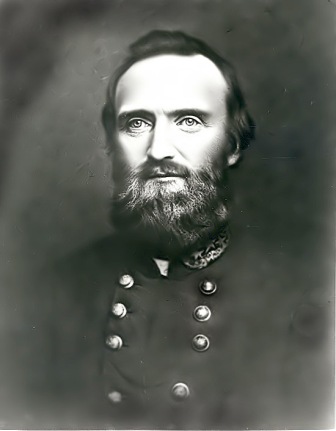
2) Gettysburg, PA. Fought July 1-3, 1863, the Battle of Gettysburg is often thought to be the "turning point" of the war. The two armies suffered between 46,000 and 51,000 casualties. If you visit the battlefield, be sure to walk the "deadly mile" from the Confederate Monument to the "Angle" on Cemetery Ridge. (I have done so 3 times.) It is difficult not to visualize the fierce musket and canister fire from Union General Hancock's II Corps.
1) Sharpsburg, MD. This is by far my favorite Civil War site to visit. The Battle of Sharpsburg (also known as the Battle of Antietam) was fought on Sept. 17, 1862. It was the single bloodiest day of the war, with over 23,000 casualties. Although Federal General George McClellan failed to destroy Lee's army, the Confederate invasion of the north came to an end. It was significant enough of a Union victory to allow President Lincoln to announce his Emancipation Proclamation, which discouraged the French and British from recognizing the Confederacy. Reenacting this battle was an eerie feeling for me because our unit was selected to "perish" in the famous Sunken Road (also called Bloody Lane).

So, what are your favorite Civil War sites? Remember, you have to have visited these sites for them to count.
6:54 AM The British Bible commentator Matthew Henry was once robbed. After he was robbed, he prayed the following prayer:
God, I thank you that though I was robbed, he didn't hurt me.
And God, I thank you that though I was robbed, all he took was my money.
And God, I thank you that though he took my money, it wasn't very much.
And then he added this:
And God, I thank you that I was the one who was robbed and not the robber.
In the midst of our current health issues, Becky and I still have much to be thankful for:
Thus far Becky's cancer has metastasized only to her lungs, and not to her liver or other organs.
Her tumors are mostly in her right lung rather than near her heart.
UNC has the Cyber Knife procedure -- the only hospital in North Carolina that does. The machine alone costs $4,000,000.
The doctors and nurses have been fantastic.
God has blessed us with good health insurance.
I have a job to be able to pay for gas, meals, etc. while on the road.
I have students who are able, willing, and capable of covering for me should I have to miss class.
Becky is in good health otherwise.
God is using Becky's testimony to encourage and bless many.
Praise be to God!
Friday, February 4
8:55 PM I am looking forward to dinner tomorrow night with greedy delight. Any meal prepared by Becky is a gourmand's pleasure and a hungry man's heaven. She is planning on cooking Raclettes, which is a delectable meal that we learned to love while living in Switzerland. It is a very simple concoction made up of sausage, cheese, and potatoes, the kind of meal a Swiss shepherd might have enjoyed along an Alpine slope on a winter's day. Becky will add a garden salad to the mix. But beyond the food we're looking forward to hosting two of my students from the seminary, a lovely couple who have been out to the farm on many a Student Day but will join us for the first time as our special dinner guests. Should be a delightful evening and a great topper to what has been a great week.
7:50 PM Quote of the day (Mark Stevens):
It seems to me that the ‘project’ to make the church more professional, more slick, more appealing and relevant, has failed (At least by gospel standards). While big churches get bigger and smaller churches get smaller are we seeing any discernable changes in the way Christian’s live their lives? Are we seeing Christians’ make the radical decisions to lay down their life and follow Jesus and become disciples of him? I am sure we are but the attrition rate is much more noticeable. The standards by which we judge the ‘success’ of Christian mission are not the same as those applied to bottom lines of fortune 500 companies. Big or small it does not matter. What matters is how we live as God’s people. How we live as disciples of Jesus.
Boy do my toes hurt. If only I could learn to live this way! If only I weren't so self-centered and pleasure-minded! If only I took seriously Christ's call to Lordship as I ought!
7:20 PM This came today:
Dear Dave,
I have just finished your book Christian Archy. I have been trying to improve a few Wikipedia articles and I have added a link to your book and some other authors you listed in Further Reading.
http://en.wikipedia.org/wiki/Christian_anarchism
Glad I could help ;-)
7:12 PM We were driving to the hospital this morning on one of our country roads when suddenly a small bird flew under our car. Through my rear view mirror I could see it had been hit. As it fell to the ground, dead, I groaned audibly. Becky, who had witnessed what transpired, said to me quietly, "It wasn't your fault, honey." The scenario has played out in my mind all day long today. Death. Rarely foreseen. Yet inevitable. And determined by the Creator.
My days are numbered. So are Becky's. Christ, after presenting His petition to the Father three times and submitting Himself to the will of God, told His disciples, "The hour has come" (Mark 14:41). Then He went forth confidently from the Garden to meet His betrayer.
Becky does not fear death. Our loving heavenly Father has absolute control over such matters. If that's true when a tiny bird dies, how much more is it true when He calls one of His children home?
7:04 PM This morning Nathan told me he had closed our driveway gate. Seems someone's bull had gotten out and was terrorizing the neighborhood farmers. Funny thing, everyone thought it was one of our bulls. Well, it ain't. Our ornery bulls tend to end up in our freezer, if you know what I mean.
Anyhow, if you happen to be in Southside Virginia tomorrow, please do be careful. El Toro Loco is apparently still on the loose.
8:05 AM Becky's latest essay is all about relationships.
7:22 AM Chris Armstrong hath begotten an interesting list of words in the KJV that now have a different meaning.
7:08 AM Servants are produced when we see ourselves as recipients of grace and realize that the toughest, lowest service should be received with humility and gratitude.
6:58 AM In less than 3 hours Becky and I will be leaving for Durham and then Chapel Hill, NC. We'll make a couple of visitation calls at Duke Hospital before settling into the radiology department at UNC Hospital. It's been 20 months since Becky was diagnosed with cancer, though sometimes it seems much longer than that. It's gotten so that I can drive to UNC blindfolded. So today it's just another "normal" day in our lives, the only difference being that Cyber Knife is a new experience for us. Please keep praying for Becky.
By the way, I've been reading a great book by Bruce Feiler called Where God Was Born: A Journey to the Roots of Religion. He's referring, of course, to the Fertile Crescent. It's strange to think that I've actually been in most of the countries he describes. The Los Angeles Times calls the book "smart and savvy." I'd agree.
Thursday, February 3
9:12 PM Trivia time: Which state in the United States is both the southernmost and the widest from east to west? Its capital is also the largest city in the world.
For the answer, go here.
8:41 PM This evening Becky and I finished watching the unforgettable film Sense and Sensibility starting Emma Thompson who, despite her outspoken atheism, is a marvelous -- and humble -- actress who "has said that she keeps both of her [Oscar] award statues in her downstairs bathroom, citing embarrassment at placing them in a more prominent place" (source).

8:24 PM Many thanks indeed to Andrew Rozalowsky for his response to my query. I hope it prompts discussion at his site!
6:37 PM Delicious supper tonight by Becky. The meat came from a jar that said, "Venison, 2007." Mmmm good.
2:26 PM One of my favorite moments from our trips to Ethiopia was speaking at the commencement service at the Evangelical Theological College in Addis Ababa in June of 2005.
Well, I've just been invited to write a charge to the graduates for this year's commencement program. That doesn't happen often, so I am both surprised and honored. What can you say to these young graduates in a few paragraphs that might have an impact on their lives and ministries? Right now I have no idea and will just have ask the Lord to show me what to say. In the meantime, as we think about these future leaders of the church (whether in Ethiopia or anywhere else), may we remember the ancient prayer, "O Lord, change the world. Begin, I pray, with me."
1:16 PM Praying for my colleague and friend Alvin Reid as he travels to serve Jesus in Ukraine.
1:02 PM Quote of the day (David Guadrón):
Para muchos creyentes, Dios pierde Su poder… Piénsalo, para muchos, Dios fue grande en sus vidas y ahora no lo es más… Pero Dios no cambia. Él sigue siendo el mismo.
What a joy to know that God never loses his power because God never changes.
(P.S. If you're wondering who David Guadrón is, go here.)
12:30 PM Care to join us in Ethiopia? In July, 2010 we took 23 people to Ethiopia, where we divided into 6 teams. This video follows the Konso/Guji Team in Burji.
12:18 PM Arthur Sido has just published a lengthy essay called A different take on separation. It is Arthur at his very best. He concludes:
Better that we should be a persecuted minority that stands for the truth and apart from the world than a willing accomplice to the cultural stupor we find ourselves in.
Here's a prayer I have prayed many times and it's always helped me: "Lord Jesus, please help to me bear a faithful witness for your exclusive Lordship right here in North America."
11:38 AM Mark students: Have you noticed a pattern yet?
Jesus has been establishing His authority over that of the Pharisees and teachers of the law. Here's what we've seen thus far. Jesus has authority:
-
over nature (1:16-20)
-
over demons (1:21-28)
-
over sickness (1:29-34)
-
to preach (1:35-39)
-
over defilement (1:40-45)
-
to forgive sin (2:1-12)
-
over men (2:13-17)
-
over tradition (2:18-22)
-
over the Sabbath (2:23-28)
The emphasis in each of these pericopes is the same: Jesus Has authority. Not only was He able to unfold the Scriptures in an understandable way, He avoided the platitudes and ingenious hair-splitting of the religious teachers of His day. People were amazed at His teaching. They quickly recognized that His doctrine was independent of the rabbinical forebears of Judaism. "A new teaching," they said with open-mouthed astonishment, "with authority!"
Lesson:
What your favorite Bible teacher thinks is important (Piper, MacArthur, Driscoll, or whoever), but it isn't nearly as important as what the Bible says. As brothers and sisters in Christ we are commanded to search the Scriptures for ourselves and hold our own convictions (see 1 Cor. 14:5). Remember the Bereans? They didn't care how famous Paul and Silas were (Acts 17:10-11). They were eager to see how their teaching squared with Scripture!
Do you point people to the authority of Scripture when you teach? Do I?
11:10 AM Near the top of my reading list for 2011: Jesus, Paul and the People of God: A Theological Dialogue with N. T. Wright. The book includes the papers from last year's Wheaton Theology Conference.
11:04 AM Yet another opening in Bible, this time at Carey Theological College.
10:51 AM With Egypt in the news so much it's easy to forget that Jesus once lived there. Matthew saw Israel's sojourn in Egypt as a type of God's future dealings with His people during New Testament times. "Out of Egypt I called My Son," he wrote (quoting Hosea 11:1). Thus Joseph and Mary obeyed the command to flee into Egypt along with their young son. Egypt -- land of the Bible!
Below: Egypt in happier times.
(P.S. Becky wishes everyone to observe carefully just who is leaning the farthest in this historic photo.)
[UPDATE: No, Ben Durand, the answer is NOT Becky's camel.]
10:42 AM Please continue to pray for the church in Alaba. As I type this update the case is before the courts. Pray especially for the church leaders. They are simply asking that the Ethiopian laws be enforced. In the midst of all of this we continue to believe that God is in control. Immanuel.
7:57 AM When Becky was growing up she used to play a little game called "20 Questions" with her family. Well, here are 10 questions and their answers....
1) How is Becky doing?
She is doing great, now that her treatments are over. The old saying is true: "If the cancer doesn't get you, the chemo will." Even the doctors are amazed at how much physical stamina Becky has these days despite how rapidly her lung tumors are growing.
2) What's next for her?
As I mentioned yesterday, our final medical option is a procedure called Cyber Knife that tries to eradicate tumors with very high doses of radiation. Otherwise, we have finished with all chemo and radiation therapies. Her tumors are really not the result of lung cancer; she has metastatic uterine cancer, which makes her case a bit unique.
3) How is your Ethiopia ministry going?
Like gangbusters. We maintain constant contact with the churches in Burji and Alaba. We have recently sent money to assist the persecuted church there. We are still traveling and speaking about Ethiopia every chance we get. This ministry is still "fulltime" for us!
4) Will you be going back to Ethiopia soon?
Not this year. Instead, we are planning on sending a veteran-led team of 16 people this November to carry on the work.
5) Why the trip out west?
Becky and I have a deep desire to see people and places we came to know and love through the many years we lived in California. We are planning on leaving a day after graduation.
6) Do you still do Civil War reenacting?
It's been a long time since we've reenacted. Let's just say our priorities have shifted in the past couple of years. I do miss the living history aspects of the hobby, and especially being able to hold period worship services on Sunday mornings in camp. The reenacting community is a huge mission field.
7) What are you working on today?
Becky is finishing up sewing a duvet cover and then we hope to get some work done outdoors in her garden and fruit orchard.
8) Are you still riding horses? Not since I gave my last horse away to a homeschooling family.
9) Are you and Becky leaders in your church? No. We seek rather to be servants. I am not an elder (or even a deacon for that matter) but we seek to support the current leadership there in any way we can. Currently Becky is the Bethel Hill webmaster and is doing a splendid job of it.
10) What is your 5-year plan?
To be obedient.
7:36 AM B & H has published a book on the Gospels that will prime your pump. It's by Ward Powers and the title is The Progressive Publication of Matthew.
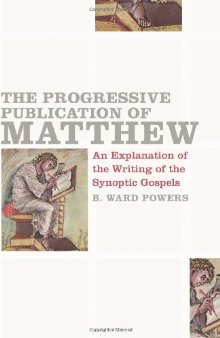
After looking at a prepublication draft, I wrote the following blurb for the jacket:
The Progressive Publication of Matthew is a tour de force both in its scope and depth. No serious student of the synoptic Gospels can afford to ignore it.
I think you'll enjoy reading it as much as I did.
Wednesday, February 2
6:40 PM Wow. Another great post by Allan Bevere. Read The Church Has an Edifice Complex.
6:35 PM Listened to this excellent sermon today; Die Verkündikung der Geburt Jesu. The message treats Jesus' association with the city of Nazareth. "Gott kam in die Dunkelheit herein."
6:31 PM In response to Andrew Rozalowsky's post about the translation of 1 Cor. 16:13 in the ESV (which, by the way, happens to be a very popular version on campus these days), I might note that the ISV renders these imperatives as follows:
Remain alert. Keep standing firm in your faith. Keep on being courageous and strong.
It is clear that we did not agree with the rendering "act like men" for the third imperative as we did not think the expression was gender specific. But do note that we also tried to bring out the force of the present tense of all four commands. Is this an over-translation? Are we reading too much into verbal aspect here? After all, I'm not aware of any other translation that does this.
(Andrew, I hope you don't mind me posting a blog entry here on the topic rather than commenting on your blog. This is my way of hopefully alerting others to your post and sending my students your way.)
6:25 PM Received this query from Romania:
By the way brother Dave...i read on your blog about your wife, sister Becky that she had cancer. How is she now?
I replied:
She is doing fine. We are going to try a procedure called Cyber Knife this week and next to remove her lung tumors. The Lord knows if it will be effective. We do not worry and have no complaints at all. God has been extremely good to us through 34 years of marriage.
Have you read her essays on suffering? Here's the link.
http://www.daveblackonline.com/our_cancer_journey.htm
God bless you my brother.
Dave Black
By the way, a website called the Comfort Café also posted a nice story on Becky's cancer.
6:17 PM There's some good advice from Andy Bowden on how to learn German. Andy is one of my Th.M. students and I can tell you, here is one man who is devoted to mastering the languages, both ancient and modern. I especially appreciated his final comment. Speaking of Andy, as a grad student he is participating in this project over at Logos Bible Software. As they say, it's a good way to get published while also contributing to the world of scholarship.
6:12 PM As an incurable dog lover, this You Tube was too good to pass up.
6:06 PM Unbelievable! I finally found someone who speaks faster than I do. At any rate, he does a pretty good job of explaining the difference between "United Kingdom," "Britain," and "England." Since my family comes from Wales, it's not a bad idea to know how the Welsh fit into the picture.
6:00 PM Okay, Rod, here are the 7 things you asked for:
-
Pauline authorship of Hebrews (yep, you got that one right)
-
Authenticity of Mark 16:9-20 (ditto)
-
High value of Byzantine text type (though not its primacy, contra my colleague Maurice Robinson)
-
Matthean priority
-
Originality of eike in Matt. 5:22 (see my Novum Testamentum essay)
-
Originality of epoiei in Mark 10:20 (see my New Testament Studies essay)
-
Originality of ho on en to ourano in John 3:13 (see my Grace Theological Journal essay)
Do these suffice?
Sincerely,
Your friend, the Un-Blogger
P.S. I'm stealing your statistics on New Testament participles to use in my Greek classes when we introduce the subject in 3 weeks.
5:54 PM Here's a good essay on what is probably the most disputed problem passage in Mark.
5:48 PM The book Loving God by Charles Colson (Zondervan: 1987) contains the following fabulous excerpt about our tendency to organize everything we get our hands on (pp. 196-97):
It is the nature of man to organize. Probably since the Tower of Babel we have been setting up hierarchies, organizational flow charts, orders of authority, and all the other structural schemes dreamed up through the ages. The more advanced the civilization, the more refined the organizational schemes.
However, though structures are essential to hold society together, they are there to serve, not be served. The marvels of modern technology have produced a sophistication in systems and structures that encourages what Jacques Ellul, the French historian, calls "the political illusion," the misguided belief that all problems can be solved by structures – namely, institutions. So for each new problem, a new institution is created.
Unfortunately this mentality has invaded the church, and we treat it as a structure (and just another one of many in society at that) dependent on charts and manuals and plans and computer print-outs.
But the true church is not held together by any structure man creates; it is not an organization. It is alive, its life breathed into it by a sovereign God. Its heart beats with God's heart. It is one with Him and moves as His Spirit moves – where he chooses and often against the designs of man.
The life function of this living organism is to love the God who created it – to care for others out of obedience to Christ, to heal those who hurt, to take away fear, to restore community, to belong to one another, to proclaim the Good News.
5:22 PM Our study of Mark, thus far, has been utterly delectable. We have seen how Jesus left the comforts of His "home" in Capernaum (the house of Simon and Andrew) to travel among the villages of the region, preaching, teaching, and healing. As He put it, "Let's go out to the nearby villages so that I can preach there also, because this is why I have come." He added, "I must preach to the other towns also." Christ recognized that He had a divine mission to preach the Gospel throughout all of Galilee, not just in the comfortable cities. He felt obligated to preach His message to the as-yet unreached peoples of the other parts of Galilee. This was not a mission He undertook Himself. It was a work to which He had been divinely appointed.
Whenever people ask Becky and me where we work in Ethiopia, our answer is always the same. "The Lord Jesus has appointed us to work in…." This appointment has been conferred upon us. We did not choose this work. I feel exactly the same way about the many other foreign nations in which I have traveled in recent years, some of them "closed" to the Gospel. This sense of divine appointment was absolutely essential to Jesus' preaching ministry. And so it is today: It is the Lord Jesus Himself who opens doors of ministry – and sometimes closes them as well. Our only responsibility is to be obedient to His leading.
Tuesday, February 1
5:58 AM How a strictly literal translation of the Bible fails us. Thanks for the reminder, Andrew.
Note: In my exegesis of Mark class I do not permit my students to produce a literal translation of the text. Anybody can say, "The beginning of the gospel of Jesus Christ, Son of God." Much better, in my opinion, is "This is how the Good News about Jesus Christ, God's Son, began."

5:52 AM From chapter 5 of Paul, Apostle of Weakness (forthcoming):
Although it would be unjust to Paul, and to ourselves, to construct a systematic picture from such disparate material and then see the whole complex as determinative in any particular case, nevertheless certain patterns do emerge, not only in those passages where weakness is a comparatively prominent theme, as in portions of 1 and 2 Corinthians, but also in other less salient passages. Broadly conceived, the Pauline weakness motif is composed of three sub-themes: the anthropological, the christological, and the ethical. These are the three inseparably related components of Paul’s gospel as well, and understandably so, since the terms for weakness are used primarily to defend and to illuminate the apostle's preaching.
The book should be out later this year, so der Herr will.
5:46 AM Check out this photo of the Complutensian Polyglot. What a remarkable tribute to the typesetters of that day. In just three short years the world will be celebrating the printing of the first Greek New Testament in 1514 -- a part of the Polyglot. The Rico Blog has an excellent discussion of this Bible -- a must read if you ask me.
5:41 AM I'm jazzed! This week we finish up the entire indicative mood in my beginning Greek classes. I love teaching students Greek. Even more, I love watching them learning to love this language. But best of all is watching them grow in their love for the Great Author and Subject of the New Testament. An old Scottish proverbs puts it well:
Greek, Hebrew, and Latin all have their proper, but it's not at the head of the cross where Pilate put them, but at the foot of the cross in humble service to Christ.
Amen!